#both are completely understandable in their actions and we can empathize with both without needing to make one the bad one
Explore tagged Tumblr posts
Text
"No, you don't understand, my child is ACTUALLY autistic. With PROFOUND autism. He's not like you. He runs into the street because he doesn't understand that it's dangerous"
I used to drown myself whenever I was near a swimming pool because I'd walk in without any floatation device or ability to swim, because I didn't understand that it was dangerous. I wasn't allowed anywhere near a pool unless one or both of my parents were nearby and in swimwear so they could jump in after me if I did that. It's possible your child will properly process the danger in his actions someday, even if it takes a while. And if he doesn't, there are other rules you can set that will make it easier for him to keep himself out of trouble.
"No, but-- he also won't speak to me if too much has happened during the day, we can't do as much as other people can or he shuts down!"
I used to go both non-verbal and have sobbing meltdowns nearly every time I had to practice the piano (which was daily for a while, and soon slowed to a stop because of the meltdowns) because the prospect of making a mistake was So Unacceptable to me in my mind that every time it (inevitably) happened it felt like the world was ending. Selective mutism in autistic people is strongly linked to sensory and emotional overwhelm. Additionally, there are autistic adults who grew up completely non-verbal and ended up having extremely fulfilling lives and successful careers. So, I don't think it's the worst thing ever that your child needs more downtime to avoid these shutdowns. Maybe you should pay closer attention to what exactly sets these feelings off in him and accommodate him without resentment or judgement.
"You don't get it. He's REALLY autistic - he can't even read without significant help!!"
My monotropism is so severe that it takes me a substantial amount of time to read things because my focus pinpoints words and letters completely out of order. I straight-up used to think I was dyslexic. I kept reading because I enjoyed the act of reading, even though it took me much longer than my peers to get through a book. Maybe that shouldn't be something you shame or pity your child over, and it's possible that if you get books that pertain to his interests that he might be willing to work on getting through the book properly - again, even if it may take him a longer time.
"But he doesn't even enjoy holidays! Every kid is SUPPOSED to enjoy holidays!!"
When I was a kid I'd have crushing existential meltdowns every birthday (and the days leading up to my birthday) because the moment I learned that old age leads to death, every birthday became a marker that I was getting older and was coming closer to death. My parents did their best to distract me from this by creating happy moments that directly related to my interests and were conscious of my social and physical energy levels. Maybe figure out WHAT it is about these holidays and celebrations that upsets your child, and work to not involve those things in the celebration, and/or work on distracting your child from negative thought cycles that are related to these holidays in a way that is accommodating for him.
"His stims are actually harmful, though!!"
I don't have good hearing anymore because I used to stim by playing music on my headphones so loudly I could feel the vibration in my skull. Unfortunately, harmful stims are real, but it's your job as a parent to not REPRESS, but instead REPLACE these actions with a suitable alternative that will satisfy the need without causing the harm. It is necessary to empathize and work on understanding your child in order to achieve this.
"Stop it. Shut up. My child is nothing like you and will never be like you. He's ACTUALLY autistic. He has PROFOUND autism. He isn't like you."
You refuse to see a future in which your child can simultaneously be autistic and present in a way that appears functional and neurotypical at a glance. You refuse to see your child as a future adult who won't be an exact carbon copy of who he is, now. You resent your child because of a lable you treat as a shameful disease when it literally only means his brain is wired differently. You focus on how his lable makes YOU feel and look, and not on how it affects HIS life. You treat accommodating him as a tragedy you should be pitied for, and not a reality of parenting. You complain about the high costs of "treating" him when the "treatment" is child abuse that will leave him with lifelong scars. Stop getting into arguments with autistic adults and start learning how to love your child without resentment and without removing him from his autism.
#Stupid shit#Rant#Vent#Sorry but im just getting so fucking sick of#Autism moms#And the way they speak about their children as if we could never understand#I understand perfectly - you resent your child#I actually used to go non-verbal even MORE frequently as a teenager and now it's very sporadic#But my parents never treated me like a FUCKING BURDEN FOR IT#I just fucking hate these social media parents of autistic people so fuckingmmuch#It's so much 'please pity me!! I abuse my child!!!'
24 notes
·
View notes
Text
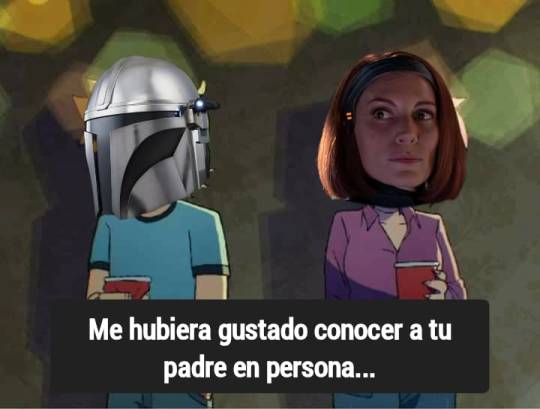
I am happy and a little nervous to start here. English is not something I master, so please let's go slowly. If you don't understand something, you can ask before anything.
I have a lot to say and I hope to gather more friends than anything else. I am open to dialogue but I repeat, insulting is not an argument and you leave. I have seen how Duo Din and Bo katan have coexisted during these seasons; I never expected that this interaction would deepen from the fact of giving each other the opportunity to open up and get to know each other.
I don't deny that at first I didn't see something between them; because I was more distracted by the action of the series and the euphoria. But my opinion completely changed in the season 3 finale.
When I saw how Grogu protected his father and in that process, I included Bo (and I'm not saying that he saw her as a mother but he saw the need to protect her, feeling her closer and part of him) So I change my perspective to this season.
I had to rewatch the series several times, hahaha I'm not lying and it makes me laugh but I did it. Then I started to see those little details between Din and Bo katan. Certain parallels and how hatred came to be appreciated. Since there were signs of flirting, he added verbal and body language, non-verbal language, approaches and even the dialogues, the music. A way to pair them, but not as a cliché couple, as they always portray us. With that cliché romance that always repeats itself; no no
Here they were giving things a process, this type of relationship in which both come wounded, with doubts, with traumas, something that must be slow because if not, it won't end up cooking. And living in a world like the one we live in, where survival is substantial, it is very likely that you empathize with them, understand them and understand how they have done what they have done and how they walk hand in hand.
I do not want to come to talk for the sake of talking and I will try to take all the visible and documented elements to show that indeed; There was no romance as such in this season between them, but there were romantic overtones, there was subtle interaction of this type between them, so much so that Grogu realized that something in Bo was changing. Being sensitive in those aspects, come on, that cannot be hidden from the child.
I have also seen how because of all this, toxic fandom and harmful people have given themselves the right to criticize, mock and attack. I understand it's Star Wars, without generalizing, don't expect many to understand or be mature or allow themselves to question or see beyond their own very personal visions and tastes.
But as I say; Your tastes are clouding the panorama or denying a palpable reality just because something is not to your liking and attacking it. More than sad, it's pathetic. Although anything can happen in The Mandalorian and no one can deny it, if we talk about possibilities, then I tell you, the possibility of something healthy developing is there!!! among them like so many ships from other SW content and clearly those little messages have been there for a reason.
"You don't talk about what you don't know" I love that Din said that. Because if you do not take the time to objectively question this union, to see the content again, you will continue in that ignorance of the elements, which is not just me (because it is not just my opinion, I base it on other aspects) Many others
I would like SW to understand that it is not just a bias of the population or of a certain country that has fans or fandoms about its content. We must give priority to everyone, this is a global phenomenon, seen in many places. And although the program has a family focus, nothing is an obstacle for them to show that no matter what it is, who it is, feelings and emotions are also valid and allow us to surround ourselves with positive people, becoming someone better for those who little by little have entered our hearts. No matter how badass, how Mandalorian, or where you want to be from. No matter the conflict or situation you are going through. Star Wars is based on human emotions and love is not left out of this.
are proving it and they only come to silence them.
22 notes
·
View notes
Text
(Longer read) It was extremely hard to find character takes without brainworms concerning Wakanda Forever in the thick of silly ship wars or character stanning, I'm not going to hold you. Each side had some level of misses going on. Everybody was too busy making another character a scapegoat or harping on about how good or bad a Shuri ship was. At best, a character seemed to be understood a little bit, but then diagnoses of other characters were woefully one-dimensional or mild mischaracterizations.
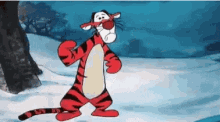
So anyway, I want to talk about it and give every character their grace.
Don't mistake me. It's not wrong to connect with one side more than the other. In a video interview, director and writer Ryan Coogler even stated it was written in a way that who you root for could change and depend on the day. He wanted both sides to be sympathetic, but never evil or wrong on all accounts. It was just a case of people trying to do the best they could with what they're dealing with. It was a story about grief and how it affected us. It also came with a layer of bipoc experience and colonialization.
It makes sense for you to follow Shuri and Wakanda as they are the protagonists. It is sensible to empathize with Talokan, too, given what we learned about them.
What drives me bonkers is completely spitting on the narrative, making it into something it never was. (If it doesn't apply let it fly!)
If some fans seemed to understand Namor, more than a comfortable number of times, it turned into oversympathization at the expenses of other characters and his own character development. They try downplaying Namor's canonically rough edges and faults while blaming Nakia or Ramonda.
It appeared that they understood Talokan's points, but suddenly, that same critical thinking or humane sympathy is in sparing doses for Wakanda (their sister nation).
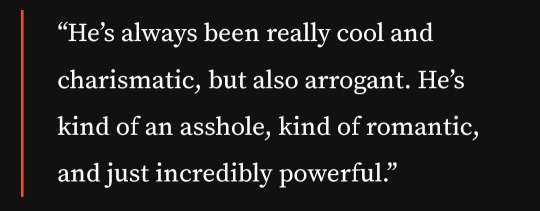
I just think people need to remember that Namor is... Kind of an asshole in any canon. He was literally called that and arrogant by Ryan Coogler, which is what we have seen in Wakanda Forever.
Namor is a multi-faceted character. His motives are upright and just. He's not entirely a "villain." Everything he did in Wakanda Forever had a rhyme and reason. His actions were in response to something (e.g., Wakanda unknowingly jeopardizing Talokan's safety). No, Namor didn't want to hurt Shuri, nor did he view it as him killing her mother. Yes, he genuinely sought out kinship, support, and an alliance with her. Yes, it is true that he holds respect and admiration for Shuri and Wakanda (see Con La Brisa or Namor's first and lines just for three references).

At the same time, he had his missteps. His diplomacy skills (barring his first conversations with Shuri) sucked exponentially! Namor was difficult with Ramonda. He intruded and constantly tried to give orders, make demands, or give Wakanda ultimatum.
These things can co-exist. As Joe Robert Cole said, Namor wasn't wrong for what he felt or his objective. His point of view is comprehensible and valid, but the problem was his approach. Namor even admits how Shuri had every right to kill him to Namora, so yes, he is flawed and had fault.
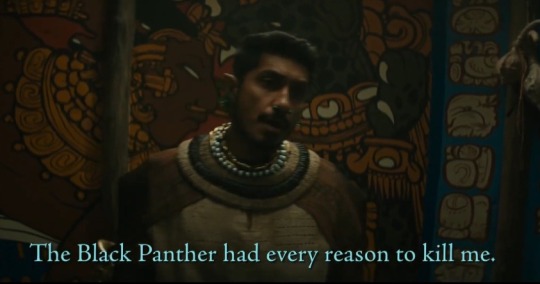
If some fans seemed to sympathize heavily with Shuri, they oddly villified and outright misconstrue Namor as something "anti-black," an oppressor (pure insanity), or a purely villainous, evil finger twiddling mastermind who sought to manipulate her right from the start.
These are stupid reads that's blatantly non-canon, mind you. Ryan Coogler even debunked that. He stated that he wanted their scenes to read as intimate and legitimate human connection amongst people who mirror.

There is also the fact that, if anything, the only character that was to give the impression to being "fooled" was Namor.

I think people should also realize how Shuri was not at all ok (aka, her flaw). This is another thing Ryan Coogler stressed in an interview. Namor and Shuri were intentionally two sides to the same coin. The pain one had was reflected in the other. Shuri was paralleling Namor in his thirst for retribution and destructive grief, but the difference is that she stopped herself from crossing the point of no return as he did, while offering her hand to pull him back.
"Vengance has consumed us. We cannot let it consume our people." Shuri wouldn't have said that for no reason.
There is an important point behind Shuri and Namor resonating with one another. Attempting to erode the connection they kindled in Talokan or misconstrue either of the two is a disservice to the movie's intricately structured theme.
If some fans loved Okoye and empathize with her struggles, they took shots at Ramonda for snapping. Yes, Okoye is an amazing, sympathetic character and tried her best. Okoye was suffering too, but do not neglect Queen Ramonda's pains.
"I had to lead a wounded nation and a broken world."
This is the same woman who lost her daughter for 5 years in the Blip, lost her son three times with the final being permanent, and lost her husband, who was politically assassinated. Throughout all of this, she had to lead a broken nation through a broken world herself. In Wakanda Forever, Ramonda had to deal with a dangerously grieving Shuri whose whole world was torn apart. She had to stand strong, seeing her daughter come undone while grieving herself.
Okoye stayed loyal to the throne when N'Jadaka (T'Challa's supposed murderer) took it while she and Shuri ran for their lives to the Jabari. Okoye's husband, W'Kabi, was a traitor. Ramonda pushed this all away (likely because she knew Okoye's heart and she understood the situation), allowing Okoye to continue serving at her side as her entrusted general and friend.
Ramonda told Okoye Shuri wasn't ready and told her not to take her on the field. Ramonda stressed her concerns about Namor (an unknown player with vibranium who had unexplainably breeched their boarders, warned them of their military power, and acted with help). Still, Okoye insisted, assuming full responsibility over Shuri.
Yes, Queen Ramonda was acting more like a mother than a queen here, and it wasn't the best decision she could've made (Okoye is their best warrior and was the only one who had fighting experience against Talokanil). However, it shows that she was human. It makes complete sense that the dam broke. She also had a point: Okoye failed in her duty, an insanely important duty that determined the fate of Wakanda.
Shuri isn't just Ramonda's daughter. She's the apparent heir. Shuri is a vital pillar in Wakanda as:
A) the apparent and only heir
B) head of Wakandan technology and design
Shuri is a leader in more ways than one, so her being taken is nothing to take lightly. Shuri even told Namor herself that Wakanda wouldn't rest until she was returned. When she comes back, a lab technician confirms this, stating to Shuri that the city has been stressed and restless in her absence.
All in all, this was a tragic fallout spurred by grief between characters with a mother-daughter dynamic.
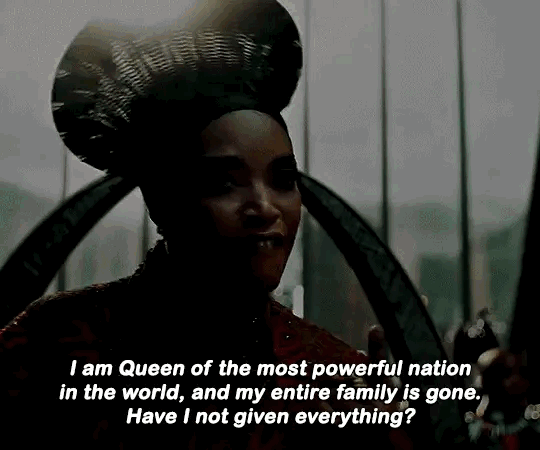
Then there's Nakia, who mostly gets blamed for everything when she was roped in with her hands constantly forced. Even in canon, she was mistreated with Shuri ostracizing her. I'll probably write a dissection on her because it's just so crazy to me, but to give a rundown:
☆ Nakia lost "her everything" thrice. She had to be a single mother to Toussaint (who she also had to keep secret).
☆ Nakia's lack of presence at T'Challa's funeral in Wakanda was misunderstood for "running away," when she was told by T'Challa not to attend in fear of exposing their child. This led to characters pressing or misjudging her for it. Shuri had snip remarks towards her and even ignored her calls, yet Nakia remained patient and her side.

☆ The grandmother of her child pulled up to her workplace and home in Haiti, practically pleading with her to save Shuri (the love of her life's beloved sister). Queen Ramonda came to her, urging her to come out of retirement as wardog to rescue Shuri from those who held her. Neither Ramonda nor Nakia knew that Shuri requested to be taken to Namor. There was no rapport formed between them and Namor (quite the opposite). They do not know Namor or how he treats Shuri. We, as the audience, have dramatic irony. The characters do not!
☆ Nakia acted under the order of Ramonda to retrieve Shuri by any means. Even then, she did not shoot immediately. She told the guard to drop her weapon, then shot her only because she attempted to kill Shuri.

When the young handmaiden shakily held Shuri with a fruit knife near her neck, Nakia warned her with two lines, one being a command to let Shuri go. It is understandable that the young maiden froze up in fear, but time was running out. Nakia wasn't going to roll the dice on Shuri's life either. Namor would've done the same (or probably would've killed them on the dot to save his people).
While it is true Nakia killing those two Talokanil in part led to Namor's attack on Wakanda's Golden City...
1. Wakanda and Talokan still would've had inevitable conflict.
2. Her hand was pushed.
I've seen people blame or hate on Riri Williams, too, simultaneously getting and missing the point. Yes, Namor had a reason to kill Riri. He was acting as a king and didn't want his people to suffer the same traumas that caused them to move again. T'Chaka would've done the same thing.
However, even in Namor's own words, it wasn't "about the scientist." In the original script, he furthers he would've killed a thousand scientists if it meant ensuring Talokan's safety. Unfortunately, Riri was the scientist who made the machine (that she honestly had no business creating, even if she didn't know of Talokan). They wanted to throw a wrench in the cogs by depriving them of the machine and the scientist who created it. That way, they can't possibly replicate it.

To Namor, it was "Nothing personal, kid." Not even he fixed the blame on Riri personally. He just emphasized the problematic nature of the vibranium detector and what it opened them to, what it has begun. It's like the ethical delimma question of rerouting the train: Would you save the worker working absentmindedly on the train tracks or the group of people on the other side?
Coming from his perspective, you can understand him to a degree. Shuri did, but still was firm in advocating for sparing Riri. The moment she heard and saw that Riri was a student, she couldn't just fork her over to be killed for something not truly her fault. On her brother and for her brother's legacy, she refused to kill Riri. The choice to protect Riri reflected Wakanda's overall development post-BP1. It also illustrates Wakanda's optimism (afforded by their history and position), which isn't shared by Talokan. Talokan has more pessimism (due to their history of displacement, massacre by colonial disease, and vulnerabilities).
However, Riri also shows how Namor could be wrong.
Riri is a young black girl living in a constant state of disadvantage, trying to prove herself.
“To be young, gifted, and Black though, right?”
She mirrors Namor ironically. She suffered and experienced byproducts of colonialism as an African American. Riri, who is a teenager beginning college (do you expect the pinnacle of maturity and foresight from a 19-year-old?), was just caught in crossfire. Her work was meant for a rock project her professor, for some reason, didn't responsibly dissaude her from doing (but challenged her to). The FBI stolen and weaponized it, then dared to send armed forces to seize her in order to have her make it again. They even attempted to use Riri as a guise to destabilize Wakanda, pretending to care about her safety and abduction.
Additionally, even by Namor's own words, the surface world coming for them was only a matter of time. With or without Riri. Killing her would just be pushing back the dates, but it wouldn't have solved the problem. Beyond the moral dilemma of killing a kid, it actually would've created new problems.
1. A sovereign body intruded on American soil. 2. Said sovereign body and representative of another nation took a citizen. Not only that, a teenaged citizen that poses no harm who has also created the first vibranium detector (which they wanted and are looking for themselves). 3. Assuming Wakanda obliged, Riri would've been killed and never returned. Her mother would throw a fit, and it gives them so much political ammunition and guises to destablize Wakanda.
And what can Wakanda do? They are sworn to secrecy that Talokan exists. So they'll just be taking the hits just like they almost took the hits for sinking that ship when it was Talokan. If Wakanda falls and gets plundered, Talokan is not far behind.
None of these characters are "the real villains." Each of them have nuance, goodness, sympathies, and complexities. Every single one captures the complexity of humanity.
#long reads#black panther#black panther 2#wakanda forever#bpwf#mcu#marvel#okoye#princess shuri#shuri#shuri black panther#shuri udaku#queen ramonda#general okoye#namor shuri#mcu namor#namor#nakia#shuri riri#riri williams#character analysis#dissertation#creative interviews
13 notes
·
View notes
Note
"Inhumane," what even. All that Jily shippers (and Bartylus shippers and other smaller shippers) ask is for je**lus shippers to stay out of their tags and tag their posts properly without spamming - which would be the right think to do and the correct and only way to use Tumblr in the first place, that's what tags are for. Everyone has a right to not want to see spam ships in their tag, that place is for their comfort, not for triggering content! And yet when you ask for such a given, normal thing as correct tagging, you're "inhumane" and several bloggers who spoke up about tags have been severely harassed to the point of having to turn off their asks. We need to get a grip. It's perfectly fine that others don't like your ship, it's not personal or doesn't make it an offense or mistreatment. It's also perfectly fine if people use anti tags to vent their hate towards a ship, that's what the tags are there for and that's why fans block anti tags and don't go there. What's not fine is spamming hundreds of unrelated tags on posts and harassing others and forcing your ships into other shippers tags and forcing them to see that all the time, when a lot of it is also triggering content for them. If people literally simply learned how to use tags and stayed in their corners there would be no conflict.
Hi love!, I'm right there with you. Being a Jily shipper myself, I've felt the frustration when one ship dominates the scene, making it difficult for others to have their space. I intentionally steered clear of specifics because this isn't about pointing fingers; both sides have their valid concerns.
Our choice of words is crucial. Things like “Je**lus” can come across as immature and hurtful, completely altering the tone of the conversation. While it's perfectly fine to express opposing views and critique other ships or individuals, it's essential to do so respectfully.
The conflict extends beyond just the use of tags (the tag thing is just a fact: don’t use ones that doesn’t related to your posts) ; it's about the lack of mutual respect in how people communicate, especially over something as seemingly trivial as shipping preferences. There's a myriad of issues within both sides of the fandom that warrant attention.
Btw I think anti tags are 100% ok, it’s again about the way you express it. You can say James is in love with Remus, that Sirius is a swiftie or that hitler is god ,honestly idc about any opinion as long people aren’t rude for no reason. I've just came across people saying downright awful things about shippers or fans who simply like particular characters/ship (ones that aren't controversial at all), and honestly, it's just completely unnecessary like “don’t follow/talk to me if you like x” like wth???
My sole focus is on promoting respectful and kind dialogue. Now, I'm not here to play the the "rainbows and unicorns police," nor can I dictate anyone's actions. However, fostering an environment of niceness and respect makes it much easier for us to empathize and understand each other.❤️
4 notes
·
View notes
Text
Essential Skills For Success In UI/UX Development

Introduction:
UI/UX development has become one of the most dynamic fields in the digital industry. As technology rapidly evolves, businesses recognize the importance of user experience and user interface (UI) in product success. Whether you're developing a mobile app, website, or software, a well-crafted UI/UX design can significantly impact user satisfaction and engagement. To thrive in this field, developers must possess a blend of technical & soft skills. This article will delve into the needed skills for UI/UX development success and explore how mastering them can lead to a prosperous career.
User Research And Empathy
Understanding the user is one of the first steps in any UI/UX project. This goes beyond knowing who they are; it's about empathizing with their needs, preferences, and challenges. At Infycle Technologies, Chennai's premier software training institute, we are thrilled to introduce our in-depth UI/UX Design Course in Chennai for aspiring designers and tech enthusiasts in Chennai. A successful UI/UX developer conducts in-depth user research, which includes interviews, surveys, and usability tests to gather data about the target audience.
Empathy is key in this process, allowing developers to see things from the user's perspective. By empathizing with users, developers can create intuitive interfaces that align with how people naturally think and behave. Without this fundamental understanding, even the most visually appealing design can fail if it doesn't address the real needs of users.
Tools For User Research:
Google Analytics
UserTesting
Hotjar
Maze
Wireframing And Prototyping
Wireframes are basic layouts that outline the structure of a web page or app interface. Prototypes provide a more interactive experience by simulating the actual product flow. Both wireframing and prototyping are essential in UI/UX development, as they allow designers to visualize concepts and test functionality before final implementation.
Mastery of tools such as Figma, Sketch, or Adobe XD is crucial for creating wireframes and prototypes. These tools also make collaboration easier, allowing stakeholders to give feedback early. Prototyping helps identify potential issues and iterate on designs quickly, saving time in the long run.
Prototyping Tools:
Figma
InVision
Adobe XD
Balsamiq
Visual Design And Typography
While UX focuses on user experience, UI is centered on how the product looks and feels. A good UI developer should have a strong sense of visual design. This involves choosing the right colors, fonts, icons, and imagery to generate a visually appealing interface that resonates with the target audience.
Typography plays a significant role in how content is perceived. A solid understanding of font pairing, hierarchy, and readability ensures that the text on the interface is engaging, clear, and accessible. The major goal of visual design is to provide an aesthetic experience that is beautiful but also functional and user-friendly.
Key Concepts In Visual Design:
Colour Theory
Font Hierarchy
Spacing and Layout
Iconography
Interaction Design
Interaction design is the process of defining the way users engage with a product. This includes how they navigate through different screens, interact with buttons, and complete tasks. A UI/UX developer should ensure these interactions are intuitive and seamless. Poor interaction design can lead to frustration and hinder usability.
Designing effective interactions requires understanding micro-interactions and subtle responses to user actions, such as button animations or notifications. These tiny details can significantly improve the overall user experience.
Tools For Interaction Design:
Principle
Framer
Axure RP
Lottie
Information Architecture
Information architecture (IA) involves organizing and structuring content for user accessibility and understanding. A successful UI/UX developer can create clear and logical structures for websites and applications. This involves categorizing content and defining navigation paths that align with user goals.
IA helps users find the information they need quickly & efficiently, which is crucial for retaining their attention and keeping them engaged. A well-structured interface creates a smooth user flow and minimizes confusion.
Components Of Information Architecture:
Sitemap Creation
Navigation Menus
Content Hierarchies
Wireframe Structures
Problem-solving And Critical Thinking
UI/UX development is all about solving problems. Developers must analyze user pain points and design solutions that improve their experience. Strong problem-solving skills help identify areas where users might struggle, allowing developers to create more efficient and enjoyable interfaces.
Critical thinking also plays a crucial role, as developers need to make informed decisions based on user research, data, and feedback. It's important to approach every design with the mindset of improving usability and functionality, always asking questions like: "What can be simplified? How can this process be more intuitive?"
Coding And Development Knowledge
While UI/UX developers don't necessarily need to be full-fledged coders, basic coding knowledge is increasingly valuable. Understanding HTML, CSS, and JavaScript can enhance collaboration with developers and ensure that designs are technically feasible. Unlock your potential and kickstart a rewarding career in software development with Infycle Technologies, the Best Software Training Institute in Chennai. This also allows for better team communication and smoother handovers from design to development.
A UI/UX developer who can code can quickly prototype ideas, adjust layouts, or troubleshoot issues without depending entirely on developers. This skill is becoming more in demand as companies seek professionals who can bridge the gap between design and development.
Coding Languages To Learn:
HTML/CSS
JavaScript
Responsive Design Techniques
Version Control (Git)
Collaboration And Communication
UI/UX development is rarely a solo endeavor. Developers work closely with product managers, developers, marketers, and other stakeholders to bring a vision to life. Strong collaboration and communication skills are essential to ensure everyone is on the same page and that the final product is arranged with the original goals.
Explaining design decisions, justifying user flows, and incorporating feedback are crucial elements. Effective collaboration leads to better results and smoother workflows.
Key Collaborative Tools:
Slack
Jira
Trello
Asana
Adaptability And Continuous Learning
The digital landscape is ever-changing, and UI/UX developers must stay informed about the new trends, tools, and best practices. Adaptability is critical, as developers must be ready to adjust to new technologies, user behavior patterns, and industry shifts.
Continuous learning ensures that a UI/UX developer remains competitive and can offer innovative solutions. Whether learning a new prototyping tool or experimenting with AI in design, staying curious and flexible is essential for long-term success.
Resources For Continuous Learning:
Coursera (UI/UX Courses)
Medium (UX Blogs)
Nielsen Norman Group
UX Design Institute
Conclusion
UI/UX development is a multidisciplinary field that needs a blend of technical expertise and creative problem-solving. By honing these essential skills—user research, wireframing, visual design, coding knowledge, and collaboration—UI/UX developers can craft experiences that resonate with users and run business success. As the demand for seamless digital experiences continues to grow, so does the need for skilled UI/UX professionals who can keep up with the evolving landscape. To ensure a thriving UI/UX development career, start building these skills today.
0 notes
Text
Hot Dreamtale fact that is lesser known: Dream knew his brother was keeping something from him and worried about him. He was 6 and always at the village because he was trying to do what he thought the job of a guardian was: helping the villagers (and they likely took advantage of that kindness, having him do a lot for them). Dream didn’t ‘know’ they were using him, and Dream just wanted to get back to his brother as soon as he could every day~ both brothers were abused by the villagers in different ways: Dream through manipulation/ exploiting his kindness to get him to do work he wasn’t required to for them (even him just being too nice and thinking they were all genuine with him. Many just liked that he was their positive guardian and took advantage of his help). Nightmare was straight up physically abused, and told/showed constantly that he wasn’t welcome. So emotional abuse for them both but different sides of it.
Also link to the canon comic by Joku bc I wanna bang my head into the wall and will have an aneurism if one more person references that comic on YouTube as the canon oml��
#dreamtale#second dreamtale au#dream sans#passsive nightmare sans#idk I just see people picking sides and also not knowing everything#I try to stick to the approved docs and canon content joku said was accurate making these#neither of these kids did anything abhorrently wrong#that’s not the point of their story#both are completely understandable in their actions and we can empathize with both without needing to make one the bad one#it’s more complicated than that and it does a disservice to them to try and force them into making one the devil to justify the other#they’re both abused kids that need justice#but there’s just a lot that gets misconstrued#and that one dreamtale comic on YouTube I am gonna blame for it#it’s not the canon one gahhhhh
48 notes
·
View notes
Note
What’s your favourite mlp species? Have you got any thoughts on kirins/niriks?
Request ponies, species, etc I havent done here
I am both a creature and character designer, so I have a lot of thoughts about MLP world!
Paradoxically, the non-pony species interest me less than the actual ponies, because they are all really solid and well done designs. There's not a lot I would reinterpret tbh, and drawing them would just be taking what they have and making them realistic.
The non-pony creatures tend to be more detailed because they are generally cameos and don't need to be animated doing nearly as much as ponies do.
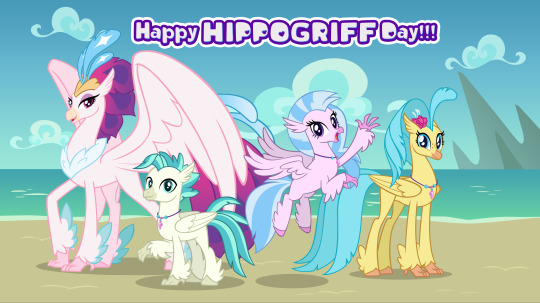
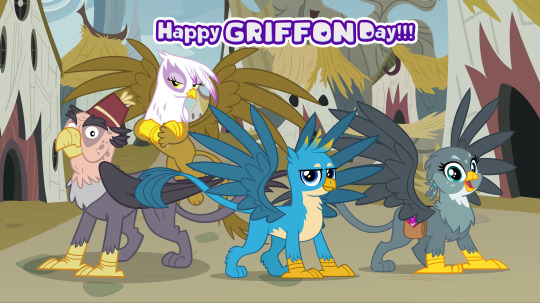
Compilations by AndoAnimalia on deviantart
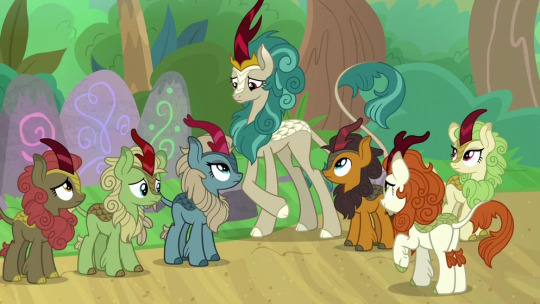
The kirins are really lovely designs! I love the ankle tufts, and how the stripes on the horns glow when using magic. Really nice creature design here.
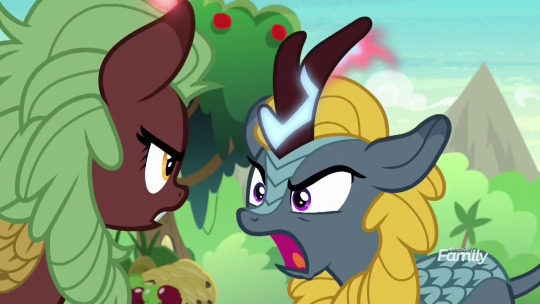
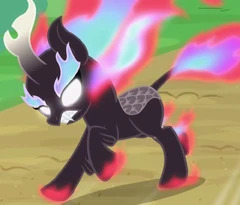
The Nirik part was a little boring, and the plot/conflict was not sophisticated enough for my tastes. But it is a show for young children, not biology majors. Lots of room for worldbuilding and headcannoning lore to flesh it out, but I prefer something I can completely rewrite. The kirin lore was fine and I'm fine leaving it as-is.
Another good one is breezies.
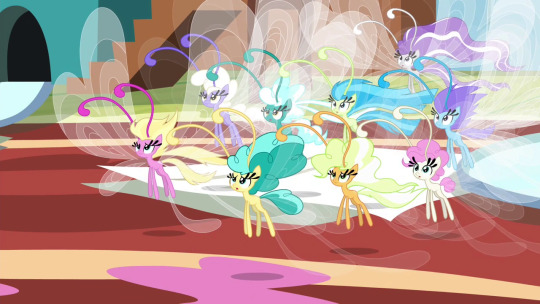
I love them they look so stupid. Their wings are over the top but perfectly designed to sell the "piece of lint in the wind" delicateness they have.
as for my favorite creature?
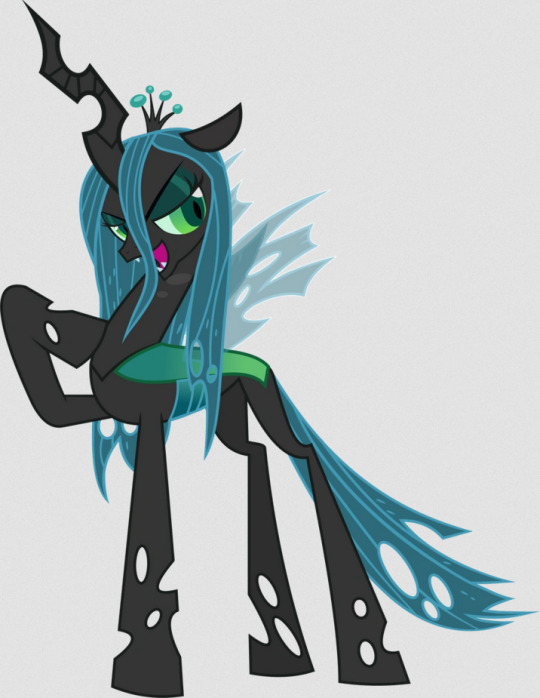
Bug momma
I really love changelings and love how edgy they are.
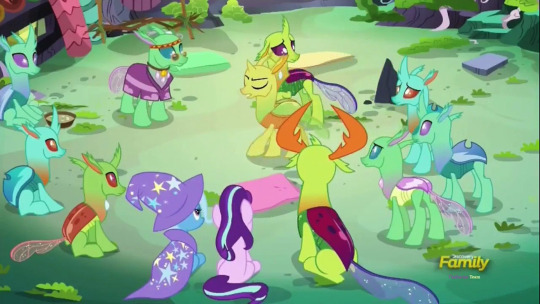
The reformed changelings are decent but I would have designed them differently. I may take a crack at them later on if I feel the need. I feel like they should either be pony-adjacent (with manes at the very least) or further removed from ponies. this middle ground is kind of like having a bug monster alien that just happens to be bipedal, with humanoid shoulders, arms, and hands for no evolutionary reason (the reason is practical effects and putting a dude in a costume but shhh)
all this is about creatures though, and its very important to talk about character design whenever we discuss creatures. A character's personality should be the quickest read about them, rather than their biology. If something is too complex, the personality gets lost because you have to spend your details adding ankle tufts and articulated fingers.
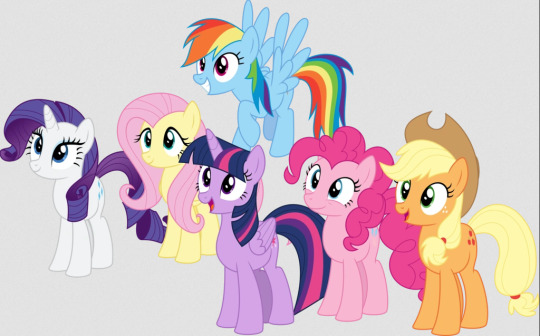
The mane six, and basically all other ponies, use the same base puppet, and each unique part needs its own turnaround. Every prop and hairdo and eye shape needs to be understood from every possible angle because these are main characters and they need to be be able to turn, spin, and do karate without the animators having to make up the back of applejack's hat every time she faces away from the camera.
Having the same body means animators know how to draw both rarity and rainbow dash from a back 3/4 view with one hoof raised. So from a technical standpoint, simple is best.
Even in big budget productions, where every character has a different body with different close and face shapes, main characters are simplified so that the audience can quickly read pose and expression without getting lost in complex clothing designs or face makeup. Reading poses and expressions quickly is very important to understand and empathize with the character before they've moved to the next pose. You need to understand the emotion the character is feeling and the action they are doing in a split second.
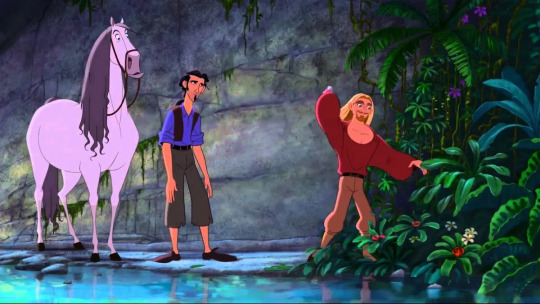
you start to get more complicated and an entity becomes less of a character and more of scenery because it has so much detail its harder to read the emotions from one frame to the next.
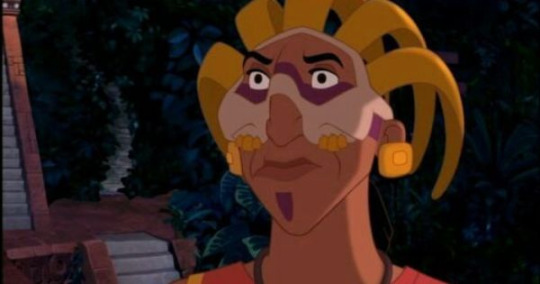
There's a reason he doesn't wear his funny hat for the duration of the movie! It's much easier to read his emotions without it. Adding lots of detail and weird props is something designers do a lot when introducing a character if they want to make that character feel mysterious or "other" because its harder to relate when your brain is stuck on the details. also masks just do that by nature of being masks.
where was I going with this
My little pony g4 has great creature and character design.
If it were high budget, major studio with All The Money, there might be more variety in character proportions, and more distinction between the different pony species. But its a puppet animated show that was always meant to make marketable designs to be turned into toys. We just get lucky when there's a good story to tell along the way
366 notes
·
View notes
Note
When did being critical of media mean that you can't like/enjoy it? There's plenty of shows that I love and enjoy that have problems with writing or character inconsistency. You don't have to swallow down every bit of canon as perfect gospel. It's literally why we have fanworks.
Also, if it's the Stede and Ed Show- which I completely disagree with on so many levels- then there wouldn't be any need for any other characters than the two of them and whatever antagonists the writers chose to include for the plot of individual eps/overall arcs in the seasons. There are plenty of characters/crew that you see in the background that are never named and don't play any major role in the plot of the show. If it's just the Stede and Ed Show, the whole crew would be able to be that and it's not. The show is fundamentally more than just the Stede and Ed Show. Are they lead protagonists? Yes, absolutely. But that doesn't make them the only important characters.
Since you asked for specific examples of the problems that I'm talking about, I'll give them.
When I was talking about "good moments that get brushed off" I was talking about moments like the conversation between Ed and Buttons after the gravy basket. They have a genuine moment of connection as they talk about their mutual experience and what it means to want to change before it's turned into a nonserious bit about Button's transformation into a bird and undercutting the real message of that conversation. Then you have Ed's conversation with Fang while they're out fishing. Fang is very open and honest about his feelings about Ed's previous behavior- and not just the immediate aftermath of Stede leaving him but even before they'd met Stede and the crew of the Revenge at all. Ed takes him seriously for all of a minute before he moves on and the moment seems to leave no lasting impact on him since his earlier behavior of impatience and irritation at the crew holding him accountable for his own actions while he was their captain.
And the complaint about screentime wasn't that "Ed and Stede take up too much time" bc I do understand they are the lead protagonists of the series, it's just that comparatively to s1, there's less time spent with the other characters and some of the crew are even whittled off both off-screen (Ivan, and if you look into the why of that it's pretty fucked up actually) and on (Buttons and the Swede)
As for my observation about Stede being oblivious and vain, he's willfully blind to Ed's faults even when other characters bring up the fact that he has hurt them. Lucius tells Stede about what happened to him bc of Ed's behavior and instead of really listening and empathizing, which is supposed to be Stede's MO when it comes to his captaining stype, Stede give him a sort of platitude and goes right back to making everything about Ed. Which Stede's infatuation with Ed makes that understandable from a character standpoint, but the fact that he never acknowledges that Ed truly did anything wrong and that there should be consequences to those wrongs is frustrating. There's no growth or change there. And Stede's vanity is incredibly obvious to me. He is consistently shown to only want to hear other's good opinions of him (like when he seeks out the men in Barbados who think that him being a pirate is cool despite the fact that he abandoned his wife and children to do so and hasn't really done much in the way of actual pirating as well as the aftermath of their confrontation with Ned Lowe and the accolades that came to him for his actions), ignore when they point out things that he did that may have been hurtful/bad (literally any conversation about Mary whether it's from Mary herself or even when Ed voiced his hurt about being left behind in favor of Stede's wife), and he has the attitude that he knows best without understanding the privilege of his educated status over his crew (Lucius pointing out that he's the only crew member that can read and Stede's surprise, His and Olu's conversation about why the rest of the crew became pirates- desperation- rather than Stede doing it on a whim for adventure, and the entire curse subplot).
Then about my thoughts about Ed. A character's mental health status- just like in real life- can serve as an explanation for their actions but does not excuse them. Ed tormented the crew in the aftermath of Stede leaving him both physically and psychologically. When he's confronted with that reality, with the anger and resentment that he's caused to the point where the crew doesn't really want him on the ship any longer, he meets that with a dismissive irritation. And even when the crew are willing to allow him to stay, he's upset that there are consequences. Consequences that are incredibly minimal given what he's done. And it's not just during this period of time that we're shown the extent of Ed's selfishness and frankly, cruelty. Because in the conversation with Fang, Fang isn't talking about the time on the Revenge. He's talking about the period of time even before they'd heard of Stede. It's implied that Ed tortured that crew just as much as he tortured the crew of Revenge. And that he never seemed to examine that behavior, rationalizing it as normal despite the way he talks with anger, disgust, and hatred towards Hornigold which is presumably where he learned the behavior.
I don't hate Stede and Ed. I think they're flawed characters and that's not a criticism. Their flaws are what make them human and realistic and interesting. But the lack of self-awareness and growth eventually starts to become grating since rather than dynamic characters, you're given flat, stagnant ones. Even if they don't ever fully "grow out" of their flaws, which most people don't in real life, having them continue to work towards better is the essence of a well-developed character from a writing standpoint.
The premise of the show was a comedy about pirates. Yes, there is a clear romantic plot written within the show between Ed and Stede. But that doesn't make it the Ed and Stede Show bc as I've said, they are not the only characters that the plot focuses on. The other characters have plotlines as well that are integral to the overall plot and themes to the show.
And when did I ever talk about Izzy's- who is the only character I can assume you mean by "my special guy"- death? I never even mentioned anything about it once in any of the posts I've made about the writing of s2. Do I disagree with the decision, yeah. But not bc it happened, but bc of the way it was done.
I've said it once and I'll say it again: I like OFMD. It's entertaining and it still makes me laugh and roll my eyes and smile. Being critical of the media you consume and enjoy doesn't mean that you don't like it.
I liked season 2! the first 3 episodes are actual masterpieces, and i personally loved episode 4 and 5. The only episodes from s2 that disappointed me were episode 6-8 and now that we know the writers were forced to rewrite those after they already started production, the reason for the weird pace of those episodes (plus a lot of scenes that got cut) is pretty clear. If anything I'm mad af at max for meddling bc in the end we only got a butchered version of what this season was supposed to be
If ppl enjoyed the eps there’s absolutely no judgement from me on that. When I watched them the first time I was entertained, but on this second watch I was underwhelmed.
The writing throughout just didn’t seem to have all that much heart behind it. And when a good moment happened, it was quickly brushed aside and the characters- and tbh I mostly mean Ed and Stede bc they never gave the rest of the crew enough screen time and this doesn’t apply to Izzy- never learned or grew from any of it.
If they were trying to build to s3 I don’t know where they were going to try to go with it bc overall s2 was such a mess imo
#some of y'all really need to touch some grass#since when did having thoughts about plot and character arcs suddenly equate to hating a piece of media???#like damn y'all don't seem to grasp nuance here#and just bc i criticize your faves doesn't mean i hate them or are attackin them either#fandom discourse doesn't equate to moral superiority#our flag means death#ofmd
31 notes
·
View notes
Text
I am a hardcore Collector apologist, and I will stand by them forever. I do believe that they aren’t truly malicious, they just don’t realize that what they’re doing is wrong.
But I also kinda like it when fanfics portray them as both blissfully naive and straight up sadistic at the same time. It’s honestly one of the things that draws me to his character. Sure, I adore it when the Collector is just an easily manipulated little kid, but I also like seeing portrayals of them in which they describe how he will violently maim someone. I actually like seeing both portrayals at the exact same time.
One of the things that I like about the Collector is what I call “Terrifying Innocence.” The Collector is definitely a naive little kid and mentally quite innocent and impressionable, but here’s the thing about little kids: they can be really fucked up. Even the sweetest and most kindhearted children can be scary af.
Cognitive empathy is mostly a learned trait rather than an inherent one. Children do not come out of the womb with the knowledge that other beings have feelings and that their actions affect others, and this is clearly the case with the Collector. So they can commit different types of violence with no reaction, as they might not be aware that it is wrong.
It’s like children who torture ants during recess. They are more fascinated by it than anything, and they don’t fully process how cruel they are actually being. When you don’t understand that other people experience pain, can’t properly empathize with it, or generally feel extremely removed from it, you become fascinated by it. It’s the same reason people like true crime or even slasher horror.
Honestly, as I said, I kinda like it when the Collector is shown to be weirdly playful upon seeing horrific things. It’s because he feels less like a sadistic ass like Belos, and more like someone who is really into slasher movies. Little kids are into violence a surprising amount.
I have been told that I’m a very compassionate person (I don’t completely believe that I am, but a bizarre amount of people have told me this, so I guess it’s true), but as a kid, around the Collector’s age, I had multiple “disaster” phases
I had an obsession with the Titanic for a while, particularly the part where hundreds of people died. I had an even bigger obsession with Pompeii, and upon seeing a museum exhibit with some of the preserved bodies, I actually took a good few minutes imagining how each individual person died and what their last moments were like. Fucked up, I know, but it happened.
Children don’t typically go out of their way to hurt others once they realize that their actions can hurt others, but they will occasionally watch (from a distance). I imagine that the Collector is like this as well. Maybe they did watch Belos hurt the Grimwalkers and were still playful about it.
I even brought up a small potential headcanon that they (slightly unintentionally) gave Belos ideas. Kinda like “what if you EXPLODED one of them? Ooh- ooh- or...you could THROW THEM IN LAVA!” Not an evil whisper-in-your-ear kinda way, more like asking a preschooler to describe what they think demons would do to people in hell or something. Kids get creative with it.
It wouldn’t be that he truly meant harm the way Belos did, they would do it because they found it interesting. They don’t understand other people’s pain, and therefore just experiment without realizing how bad their actions are. It’s interesting to me to read portrayals of the Collector where they are still show in a sympathetic light and he’s clearly just a little kid, but he also doesn’t really seem to care about others that much.
It’s realistic in a way that I like and captures the spirit of the messiness that is a child’s morality. They aren’t evil or completely sadistic, they just don’t see the severity of their actions and are mostly self-centered in terms of worldview.
So, in conclusion, we need more fics where the Collector is a blissfully innocent kid with a love for slasher films.
#toh spoilers#toh#toh collector#toh analysis#the owl house#the owl house collector#the owl house fandom#the owl house analysis#little kids#the collector#little kids are scary#honestly if we think about it#king was kinda similar at the beginning of the series when it came to lacking proper empathy#just another example of how kids are just kinda like that sometimes#toh grimwalker#children#children are weird#kids are fucked up#god damn#they have no chill#toh fandom#character analysis
186 notes
·
View notes
Photo
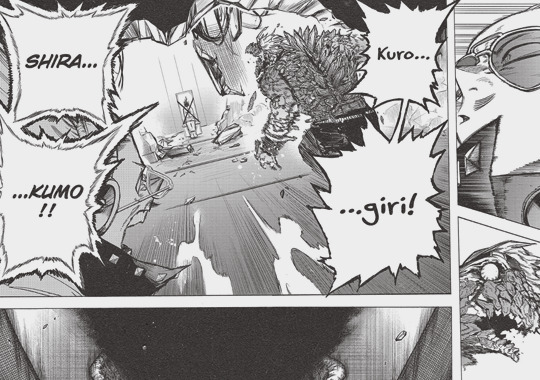
My Hero Academia, Chapter 372 Thoughts
This post could also be called “Who do you think is going to wake up, Kurogiri or Shirakumo?” I’m going to make an argument for why I think it will bee Kurogiri who wakes up undert the cut, because it ties up a bunch of themes with this arc.
1. Stopping vs. Saving
The biggest conflict of this arc, which is also the central theme of the manga (Winning vs. Saving) is if overpowering the villains in a physical fight is enough, or if the heroes need to go one step farther and save the villains. There is a lot of setup for this idea of saving villains, it starts with All Might mentioning that both of their ideas of heroism winning or saving can work together.
You can’t save anyone if you lose, but if you only focus on beating bad guys then no one will get saved. The entire previous arc before this is Deku going on a solo journey and trying to learn what exactly it will mean to try to save Shigaraki after seeing the vision of Tenko as a helpless child inside Shigaraki’s mind. The arc before that is the war arc, and remember that was the heroes levying every single hero they had in a show of military might to crush the villains and their strongest attack didn’t work.
If this arc is to be different than the war arc, then naturally it would take a different strategy for the heroes to win. I could keep going. And I will. Basically, every single fight between the heroes and their villainous foil has followed the same pattern so far.
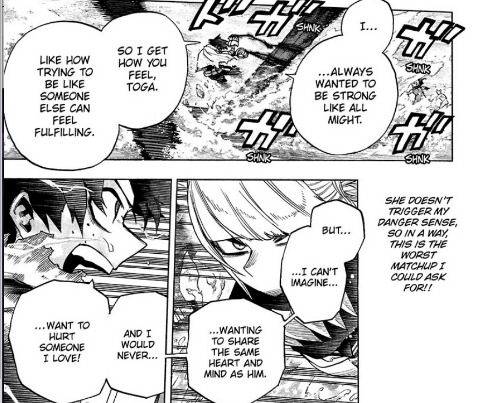
Deku rejects Toga by saying that he would never want to hurt someone I love so therefore they’re too different, which causes Toga to lose her interest in talking to both Uraraka and Ochaco when of all people she was the one who could have most easily been turned because she wanted to seek out the heroes in the first place and talk things out and see if people like her and Jin are worth saving. Deku’s rejection causes her to double down.
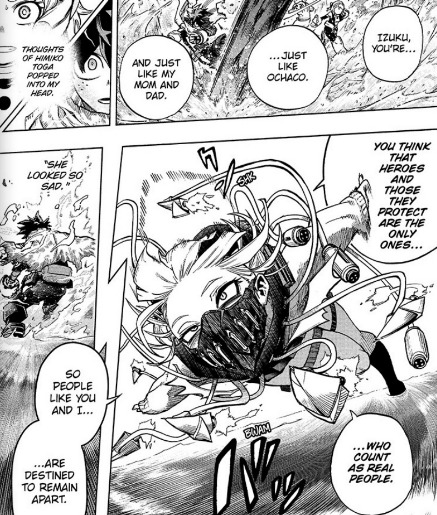
Then, we have Shoto again against Toya, Shoto’s focus is on stopping his brother, as if Toya came to his violent actions all through his own free will. He only cares about stopping Toya’s violent actions without empathizing why he became this way or why he feels. Which you know is pretty contradictory to his goal to migle with his brother “We’re gonna mingle whether you like it or not” exept, Mingling requires understanding the other person’s side.
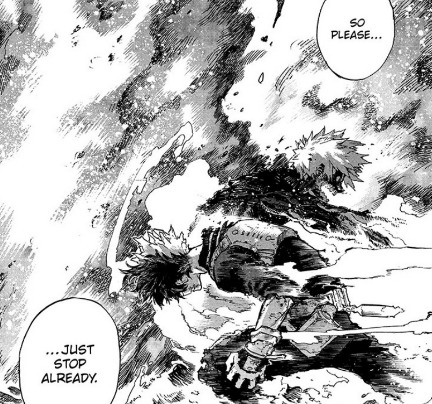
Toya, (not surprisingly) gets back up again specifically because his brother underestimated Toya’s single minded determination. Someone who learned all of his moves simply by watching news clips and memorizing them could easily copy Shoto’s move at the last minute by sight alone. Shoto didn’t understand his rother’s situation and therefore did not see Toya countering the move Shoto made specifically to defeat him coming.
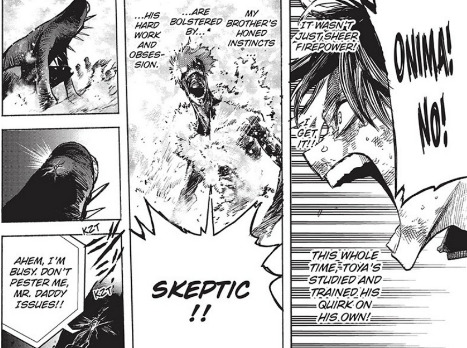
This pattern repeats itself further. Enji decides to play the hero against AFO, rather than face the son he abused, and because of that even exhausting himself and his powers completely to burn AFO alive, AFO just gets back up again. If there is a mistake the heroes keep making, si that they consistently refuse to see the villain’s point of view and perspective. It’s what Toga mentioned at the end of her fight “you think that heroes and those they protect are the only one who count as real people” which echoes Twice’s callout “You people ain’t heroes, you throw all of us downtrodden folks to the dogs.” The heroes have yet to answer to that challenge in any real way. When Shigaraki sees all the effort the heroes put into saving Bakugo, he is just reminded of the trauma he suffered as a child. The heroes will stop at nothing to save someone... as long as they’re innocent, but Tenko when he was still a child, when he could have been saved he wandered for hours on the populated city streets because he looked filthy, and came to internalize the idea that he didn’t deserve to be saved as punishment for what happened to his family.
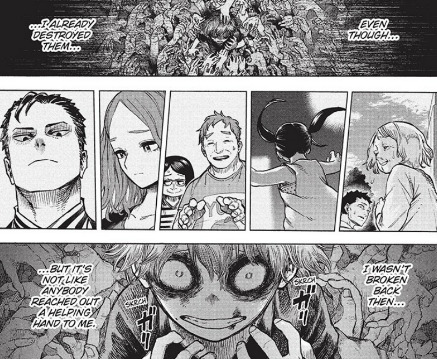
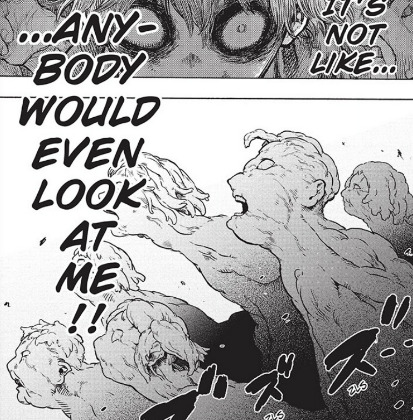
“it’s not like anybody would even look at me.” So you have this continued theme of the heroes refusing to look at the villains perspectice and suffering, and that too is egregiously repeated in the fight between Shoji and Spinner.
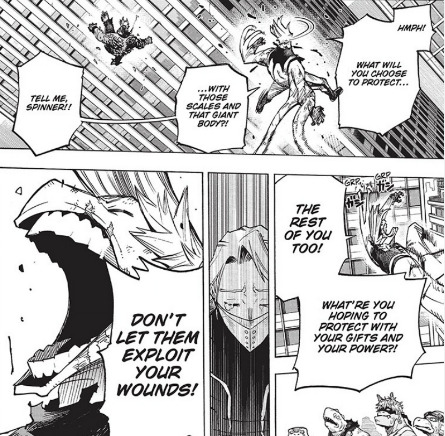
Shoji delivers this speech about who Spinner is trying to protect... when we as the audience know that Spinner is literally only rampaging as a mindless godzilla right now, because he accepted a quirk to save his best friend Shigaraki. He tells the crowds of innocent people not to let their wounds be exploited the way that Aoyama, was exploited, but Spinner is also currently in the process of being manipulated and exploited the same way by AFO that Aoyama was.
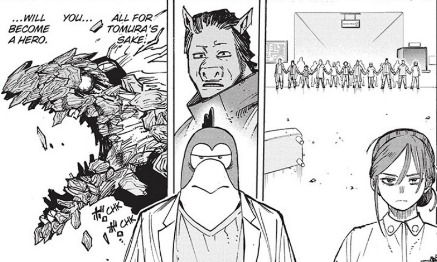
But Shoji doesn’t see this, because there’s no care given to why the villains are committing their cimes only on stopping them. SO once again, Kurogiri and Shirakumo who will wake up? I want to point out there’s another repettition of this pattern in the way Aizawa and Mic both view Kurogiri. Kurogiri’s legitimate care for Shigaraki is something both of them brush off and are confused by.
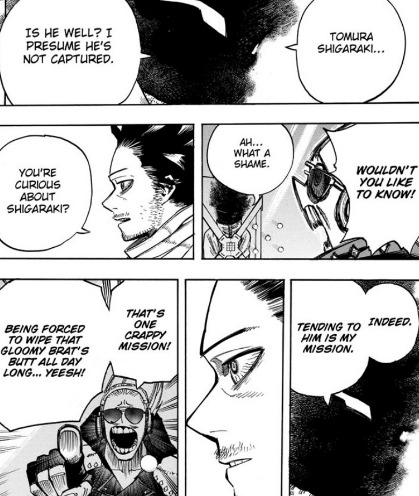

Even though, Kurogiri’s desire to take care and tend to Shigaraki is what Aizawa recognizes as a sign that SHirakumo is somewhere deep inside of Kurogiri. However, to Aizawa and Mic Shirakumo and Kurogiri might as well be different entities. The metaphor of the cat is used in Aizawa and Shirakumo’s backstory.
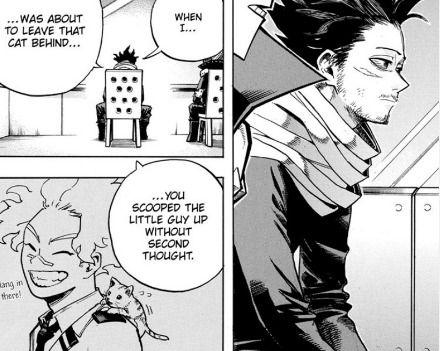
Aizawa leaves an abandoned cat in the rain because he didn’t think he would be able to protect or take care of it, however, when Shirakumo saw someone in trouble he instead saved the cat without a second thought. Does that not reflect the current situation?
Mic and Aizawa along with the rest of the heroes have already given up on the idea of saving Shigarki, in fact they actively discouraged All Might form doing so when it would have been much easier to reach him before his multiple power ups. THe attitude towards Shigaraki from the start is that he’s beyond all hope of redemption, and yet is Shigaraki not another orphaned cat left out in the rain?
Aizawa is someone who does everything to protect his students, he even took in Eri someone who was in a similiar cirucmstance to Shigaraki being kidnapped and abused by a villain who rtied to convince them they were evil deep down isnide and yet Aizawa is compelely unable to see Shigaraki as another child who was lost and hurt.
Kurogiri however, cares for Shigaraki and this is another thing that Aizawa ignores about his friend’s identity because he doesn’t even see the half of him that is Kurogiri. He is SHirakumo every time they refer to him. It’s not about helping Kurogiri, it’s about getting Shirakumo back.
So, what could possibly remind Aizawa and the rest of the heroes that Shigaraki too is a lost child, but Kurogiri waking up at Spinner’s call rather than Mics. Because it would be a physical reminder that Kurogiri too wants to save and take care of Shigaraki. if Kurogiri sees Shigaraki as someone who can be saved, then Aizawa can learn that many of the villains they are fighting against right now were once hurt children too, children like the ones they are currently trying to protect, children who should have been saved back then, and still can be saved.
#mha meta#my hero academia meta#my hero academia 372#my hero academia 372 spoilers#mha 372#mha 372 spoilers#shigaraki tomura#kurogiri#shirakumo oboro#shuichi iguchi#mezou shouji#spinner
173 notes
·
View notes
Text
The Magical Revolution of the Reincarnated Princess and the Genius Young Lady Quick Review
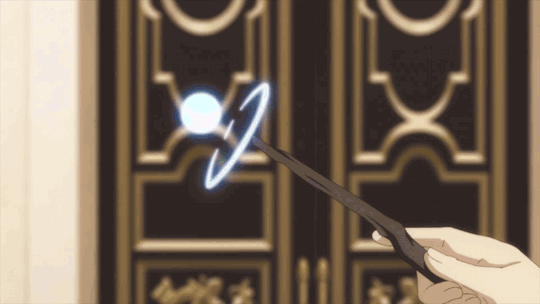
The Magical Revolution of the Reincarnated Princess and the Genius Young Lady or as we'll be calling it for the rest of this review, Magirevo is an amazing yuri anime series. It made a lot of interesting choices in it's adaptation to make the 12 episodes very punchy, fast paced and really get to the heart of the series without spending a lot of time pondering. I do wish the series was longer and we had more time for getting into people's feelings, the lives of the side characters, etc but the 12 episodes we did get are superub. The anime starts a little slow and it's jokes don't land nearly as well as the manga but the comedy in this series is mostly pushed away for action.
It was a really smart choice to turn Magirevo into more of an action yuri in terms of having it reach a wider audience. The action looks very cool and it makes a lot of sense with the ending they were building to with a dramatic fight that decides what will happen with the future of the kingdom. Everything is very intentionally building to the ending and it makes a lot of the choices make a ton of sense.
Our Protagonist Anis is charming, she is funny, she's very relatable to me even as a dumb ass because she feels very real to a lesbian who is living in a fantasy world. Euphy is very much tied into the royalty, nobility, the sense of duty but the show is also super empathic to her plight and her feeling like she had a role and it was taken form her and the grief she felt about it. The side characters Tilty, Lainie and Ilia are both really good side characters whom I really wish got much more attention but at the very least every scene with them in it was a banger, when they get to talk, it's good. A lot of the other characters I found more annoying or like they were serving their role in the story.
I think the show's politics were lacking in the detail and care they needed and it is something I really hope we could see that expanded if the show were to magically gain a second season. As for the first season I think the politics were at play were all there to serve the plot and more important to serve directly as an oppressive structure for Anis who feels like she can escape it only to be dragged in again more and more. We see that system slowly killing her soul and I think that is an effective way to show the problems with the system. The main issue is that our main villain does wish to tear down the system but we aren't given a really appropriate counter weight till like epilogue scenes wrapping up the anime.
I think another place I would have loved just a bit more care in is the queer politics of the show. The anime is explicitly gay, like we get 3 gay kisses in the 12 episode run which I mean I can't say about most other shows ever. Yet, Magirevo kinda plays off Anis's dad's homophobia is a bit, a little joke and it was upsetting to like humanize him without resolving that. We jut kinda hand waved it completely. There is some implication that maybe he is bisexual later but it's all like subtext, there is no exploring that, there is no slow moment of like understanding or whatever. We understand that the politics by the elders is like very heteronormative and we show that as like a traumatic instrument but we don't get a lot of time to really explore the queerness even just on it's own merit.
All that critical stuff said OMG I love it, the animation is so good, it's very gay, the girls are super cute, I do wish Tilly and Anis got together but like that is shipper shit [in a poly waym not in a replacing Euphie way], I the pacing is great, the action scenes are so cool, I love this anime. This is for sure going in my list of favorite animes of all time, for sure.
#Tensei Oujo to Tensai Reijou no Mahou Kakumei#The Magical Revolution of the Reincarnated Princess and the Genius Young Lady#Anime review#yuri review#GL review#lesbian review#lesbian#lesbian anime#gl#yuri#転生王女と天才令嬢の魔法革命#tenten kakumei#Magirevo
26 notes
·
View notes
Note
What do you think that sonic 3 will be about?
Hello, my dear!❤️✨
I’m terribly sorry for taking so long to answer your ask. I wanted to make sure that my thoughts were clear and reflected what I felt. I feel that quite a few themes and ideas will be explored through the third Sonic film. I don’t necessarily believe that it’s once singular concept. I also feel that the film could, potentially, take on a darker and more serious tone than the first and second films. (This is only a gut feeling with what the writers for Sonic 3 have stated in the summer 2022).
Down below I’ve shared a couple of the main themes/ideas that I believe will be explored the most:
Teamwork:
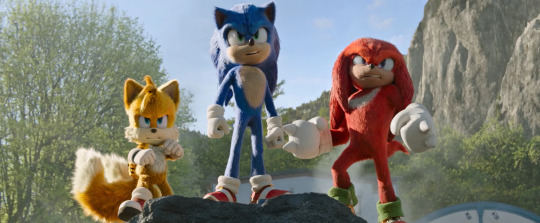
Since the dawn of Sonic’s existence, we’ve become very educated in the power of teamwork. This ranges from Sonic learning the values of working in team to him being a major advocate of teamwork. (It varies between alternate universes, such as games and TV show, and soft “reboots” of the series).
Towards the end of Sonic 2, we see the Wachowski siblings team up in an epic showdown against Dr. Robotnik and his Eggman Robot. We can see that each of them are highly skilled in various forms of combat. That is of no question. What should be empathized is them being in sync with one another. This was empathized by Sonic before he created a distraction (Sonic’s Speech). Seeing the interactions between Sonic, Tails, and Knuckles during the Battle of Greenhills, I firmly believe that the theme of teamwork will be explored. However, it will be Sonic that voices the need of teamwork and not him learning how to work in a team.
When the three of them work together, they become a heroic dynamic. Sonic, Tails, and Knuckles are able to understand each other without the need of redirection. This is a form of trust and equal opportunity for them to fight. If a team is good, then it doesn’t necessarily need a leader either. A team and their members know how to communicate with one another and encourage each other to become the best versions of themselves.
I feel—and this is strictly my opinion—that the power of teamwork will be explored with Sonic being the advocate for it. I do hope that this makes sense. If not, I’m more than happy to clarify!😊
Grief/Acceptance:
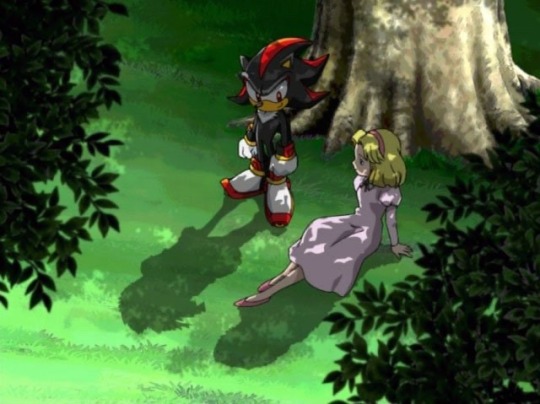
One of the hardest concepts to grasp in life is that not everyone can be saved… even if they are deserving of a second chance. No matter how hard one may try, it doesn’t always happen. There is also the notion of feeling guilt and grievance towards what was lost as well. All of these emotions rolled into one are facts that one must learn how to live with and come to accept it. I can completely understand that this may feel like a darker and grim tone. (That, and I feel like I can hear some of y’all saying “damn Mystery that’s pretty dark.” Well, Shadow has a pretty tragic backstory). I propose that this concept will be explored: Shadow coping with the loss of his friend/sister and Sonic being made aware of the darker reality of heroic actions. Both of these actions will have our characters become aware of losing something that was loved and accepting that it’s gone.
Here’s the thing: we can infer that the third film will be heavily influenced by Sonic Adventure 2 and Shadow the Hedgehog (2005) (Casey & Miller, 2022). The problem here is that we don’t know how much will be used. We don’t even know if Maria Robotnik will be a character in the film. This is a bold claim to make, I completely understand. I express this concept because of how the adaptation of the films are compared to games and interpretations. Concept art from the second film depicts the corpse of Gerald Robotnik leaning against Shadow’s stasis pod, indicating that this was a potential character (Hesse, 2022) However, this is concept art… we don’t have enough evidence to support the claim that he’ll be referenced in the third film. What do know is that Shadow will be one of the main characters and center of attention.
If anything, we could understand grief and loss the most through Shadow. And in order to approach the situation, Sonic might have to dig deep within himself to express how he felt when he lost Longclaw (and the need for self-isolation for ten years). I will not lie to you: having these conversations are tough. It’s uncomfortable to share feelings deep down and to talk about events that changed us negatively. I feel that having a conversation about losing someone that one loved will be talked about tenderly. With Sonic, I feel that we may see him not only express his feelings of losing Longclaw, but also experience him losing Shadow. Again, there isn’t enough evidence to support that the third film may 100% be a reflection of Sonic Adventure 2. All that we know is that there will be heavy inspiration. Trusting another person to share personal grievances may help other come to terms with loss.
I am not saying that people heal 100% when having these conversations, I am trying to say that it’s a starting point that leads to progress.
Hope✨:
Throughout everything, there is hope. No matter how hard the situation gets, no matter the outcome, there is still a sliver of hope that everything will be alright in the end. And despite everything, that hope is what inspires others to keep going. I feel that hope will be a big theme for the film as well.
And if y’all have any thoughts, please share them! I love to hear concepts and ideas!
#sonic movie#sonic movie 3#sonic cinematic universe#mystery anon#off topic#Movie!Shadow#sonic movie 2
36 notes
·
View notes
Text
my opinions on the different mbti types (from an intj)
enfp - you can be good to hang around in moderation. i appreciate your charitable nature; how you aren’t one to pass judgement, but that also leads to a lack in understanding one’s depth. i appreciate how easy it is to befriend you, you’re able to keep the conversation without any expectations on my part to contribute, and although you can be stupid and impulsive, it’s to a point where it’s almost fascinating, which makes it somehow nice to be in your presence. in moderation, of course. you can be very draining at some points.
entp - you’re funny to watch, but actually conversing with you can be...confusing? i do appreciate your ability to see things from other perspectives, but sometimes you need to take a step back and understand the overall reasons behind those perspectives. confidence is important, but don’t get too over zealous, we all have things to improve on.
enfj - i cannot understand you. at all. you’re so nice, it seems like you have some sort of ulterior motives. i do not trust you, you are just so warm i feel like i’m being judged every time i talk with you, or are even in the same room as you. your general demeanor is just so kind it’s threatening, you need to be less optimistic.
entj - a lot of people hate you, which i can understand on their part, but i appreciate your approach to things. with every entj i’ve met, no matter my friend’s/peer’s opinion, we’ve always had a mutual understanding of some sorts. although, i do see a lot of naivety; which i’m 99.9% sure none of you will ever admit. i admire your drive, your confidence, and things along those lines, but some words of advice; you can’t change anyone. as hard as you try, some people are just stuck the way they are, unfortunately. it’s something i’ve had to learn as well, but a lesson i think would do you well.
infp - you are adorably killing yourselves with every move; like small puppy who’s favorite toy just happens to be laid perfectly in the middle of ongoing traffic. your impulsivity hurts me deep inside. please, just try to be aware of your surroundings, at least a little. i know, ironic coming from me, but it’s all i could ask. think out your actions, just a bit. i know life may suck, but take it upon yourself to change that, instead of just falling victim to your own hurt. i wish i could just pick you up and live your life for you, it hurts to see you do these things.
intp - i like you. your humor is refreshing as well as your insight, you just cannot stay organized. you take pride in your discombobulation; your lack of care, which confuses me. because of that, it’s hard to empathize with you when you have troubles, because it could’ve been easily prevented. it makes me upset for you when i see you do this. it doesn’t come from a place of trying to overly pressure you, rather a place of care. i hope that can be acknowledged.
infj - i enjoy your presence, you are just are hard to get. i always seem to upset you in some way, so i implore you to be better at communicating those things. your productivity and insight is very much appreciated, i feel your anxiety is holding you back. we all experience anxiety, it’s a valid human emotion, of course, but don’t let it dictate your life. confidence is important, you’re allowed to acknowledge your accomplishments. also, i implore you to think deeper in terms of morality. why do you believe those things? what is the axiomatic rout of those morals? by understanding that, you gain a better understanding of the people around you. the people you deem to be bad, may think they’re good by their own definition.
intj - from one intj to another, i feel like there is a lot to grow on. we tend to be very book-smart, but oblivious when it comes to how people work, including ourselves, but just because those things are acknowledged from mbti posts and whatnot, that does not give any excuse to avoid improvement. knowledge is important if we ever want to achieve our goals, and having that insight can make things a lot easier. as much as it seems like time is easily slipping away from us, taking control and trying to pick up on those details we may normally be ignoring, may teach us something valuable. it’s also important to take care of ourselves. i find routines are an easy way to remember to do so. having designated times for everything helps maximize the amount of time to get things done, while also taking care of your needs. and give yourself breaks. having fun, relaxing, etc. can also be productive in itself. not everything that’s productive isn’t what’s directly seen as such.
esfp - you can be a lot. its very hard for me to truly understand you, and i get the impression that you feel the same about me. i feel like there’s a lot of miscommunication. we’re practically complete opposites, not just literally (intj-esfp) but in practice as well. what you find fun and what i find fun is so drastically different from one another, i feel like it’s impossible to truly have a meaningful time with each other. from both parties.
estp - i like your confidence. your humor as well. i feel like we get along quite well, although it can be hard at some points because i tend to live in the future a lot, while you’re the “go with the flow” type. that is appreciated, though, and i feel like there’s a lot to teach each other. that’s just a matter of taking the time to communicate with one-another and be understanding.
esfj - i like you, from the sidelines. i appreciate the way you think, i’m just not sure if that is reciprocated. i tend to come of very strong, which i think is quite anxiety inducing for you, but you’re very passionate about the things you enjoy. i do think it’s important for you to have more insight, though. the world is vast, and an understanding of it can be very beneficial to you.
estj - your drive is commendable. you’re very confident, know what you want, which i appreciate. i do think it’s important to take a step to think about things further to acknowledge the nuances in things, instead of dismissing them as confusing. not everything is as blunt as you’d like, and may take a bit of critical thinking to truly understand. things happen, yes, but why may they do that? is there anyway to prevent the things you don’t like from happening? those questions are something i think are important to keep in mind.
isfp - for lack of a more kinder way of saying this, i dislike you. i wouldn’t go as far as to say i hate you, but i am very frustrated with you. you tend to dismiss things for the main reason of someone just “being that way” without taking into account any other factors that may come into play for that behavior. with the isfps i’ve met, you’ve seen my behaviors as “trying too hard to be a certain way” or “pretentious” without truly understanding why i act the way i do. it gets frustrating. your very confident, but in thoughts that are lacking in insight. take a second to learn about what you’re talking about before you say things. for my own sanity.
istp - even though you seem like you’re about to kill yourself with your approach to things, you always some how get it done, which is respectable, yet fascinating. you’re surprisingly very fun, even though from the outside i wouldn’t think we’d be at all close friends. you’re not one for deep conversation, rather the kind of conversation that always leave’s me feeling refreshed. it’s important to sometimes take a break, and you’re the type of person that i can easily have that with.
isfj - you’re very adorable. your moral standpoint to most things can be a bit frustrating at some points, but you make up for it with your kind demeanor; a genuine kindness as well. your happiness and drive to help people is a commendable quality, just don’t let people walk all over you. you tend to be a bit too charitable, when sometimes it’s okay to recognize that people just aren’t the right match for you. it’s okay to take care of yourself. i know i come off strong and that can be a bit intimidating, but i promise that it comes from a place of care. be confident in yourself. to truly be able to take care of the people around you, you need to take care of yourself first.
istj - i respect you and your approach to things. i think there are a lot of things we can learn from one another. your ability to easily figure things out from your surroundings is admirable, and it’s interesting the way your mind works. i haven’t met many istjs (of my knowledge) but i think we’d get along quite well from the information given to me.
#mbti#myers briggs#enfp#entp#enfj#entj#infp#intp#infj#intj#esfp#estp#esfj#estj#isfp#istp#isfj#istj#16 personality types#personality#cognitive functions
623 notes
·
View notes
Text
The meaning of the Beast Spirits in Frontier, and what it means to control it
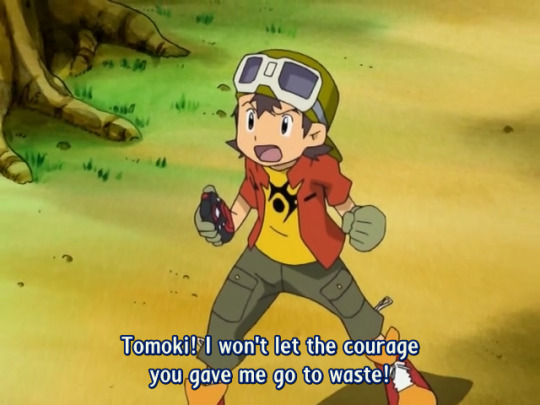
(On request by @digitalgate02.)
When you think about it, Frontier can be framed as a story of outcasts or misfits having to accept the idea of “changing themselves” in order to become better people, both literally in the sense of embracing physical transformation, and metaphorically in the sense of making attempts to do better. Implicitly, it speaks a lot as to how quickly these kids accept the idea of turning into something else -- perhaps implying as to how ostracized they’ve felt that such a thing instantly sounds appealing -- but it also adds some interesting layers to the concept of the Beast Spirit and how the difficulty of “controlling it” ties into each character’s personal story.
I think a lot of it has to do with the idea that these kids did have inclinations of being selfish or shallow at the beginning -- while they were full of potential to become heroes, they definitely started off as unlikely misfits at the beginning. In that respect, you can see the Beast Spirits arc as a sort of lesson that great power must be used wisely and responsibility...
Believe it or not, our biggest clue to all of this comes from episode 16, Izumi’s episode. It’s not directly stated in words, and the abstract summary of “determination” is passed off as a joke, but looking at the context clues around the episode indicates that’s actually not far off.
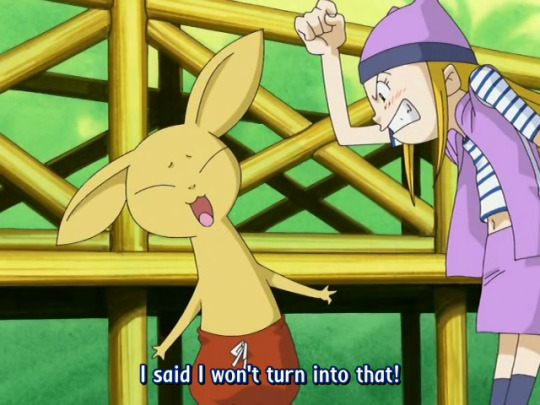
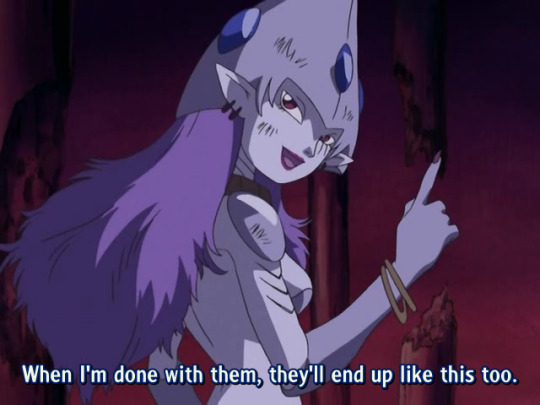
The thing is that Calmaramon is depicted as having the hardest time with her Beast Spirit compared to practically about anyone else in the group, and one of the recurring themes about it is that it’s partially because her personality is downright terrible. If you look at the context clues behind the prior episode (15), you’ll notice that while her looks are briefly brought up as an issue there and in this episode, the part that’s really freaking everyone out (and is making everyone worried Izumi will turn out to be the same) is that they actually saw it have an impact on her personality, where she was clearly conscious and able to talk but also indiscriminately destroying everything and enjoying it. At least in the case of Kouji, Takuya, and Junpei, they can be forgiven because they all did their best to keep it under control after the initial fallout, but Ranamon changing into Calmaramon had also involved her becoming someone actively reveling in senseless destruction. When everyone worries that Izumi might turn out like that, they don’t even bring up looks at all, and they all recoil when she does start showing signs of being destructive anyway.
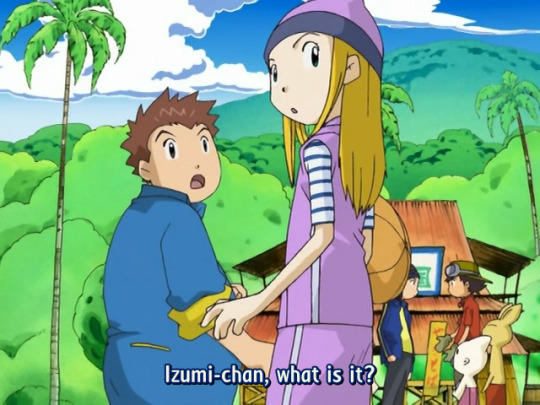
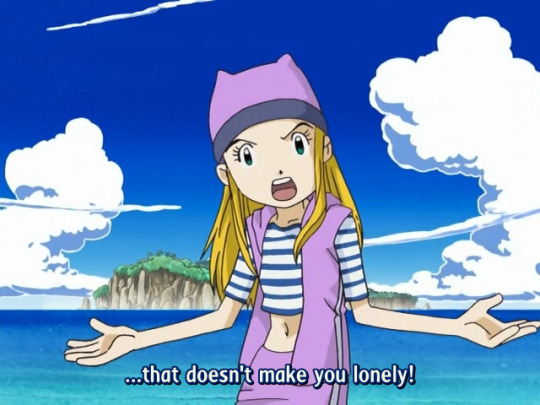
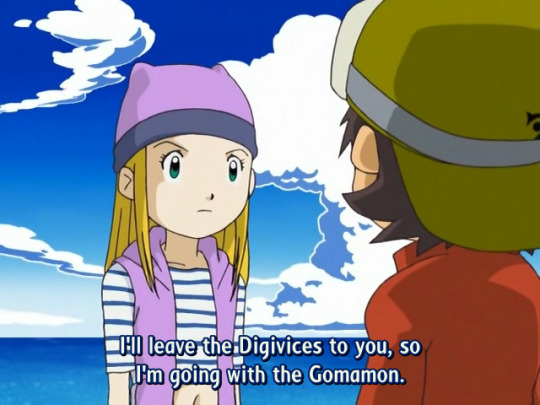
The thing is, the entire rest of the episode puts a massive spotlight on Izumi’s actions of standing up for the Gomamon and empathizing with their loneliness (which, given the contexts added about Izumi’s background and backstory in episodes 8 and 26, are most likely her feeling that the concept of “being isolated from others no matter how much you want to reach them” hit way too hard for her) to the point she puts her foot down to override the boys’ prior plan of chasing the Toucanmon and their Digivices. She actually faces quite a bit of protest from the boys on this issue, and even admits she’s not sure if her own plan will work, but focuses on the idea of doing her best to undo the whirlpool with her abilities -- that is to say, using her power to protect and help others.
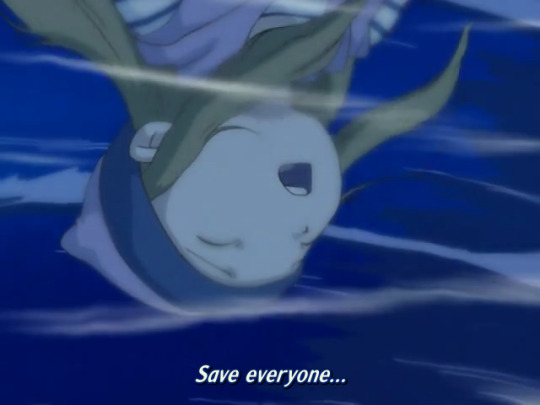
This sentiment of “I have to protect everyone” drives Izumi’s actions for the rest of the episode, to the point it’s the only thought consuming her head right before she finds and claims her Beast Spirit. So to make it clear, at the time she claimed it, the thought of “protecting others” was desperately, single-mindedly consuming her head...
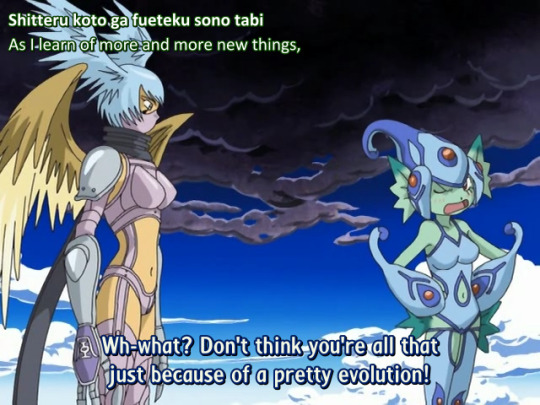

...and the contrast is immediately apparent when Shutumon emerges, and the only thing Ranamon cares about is looks.
In other words, the reason the Beast Spirit wasn’t working out for Ranamon/Calmaramon is that she only wanted the Beast Spirit’s power for the sake of pride, vanity, and dominating others, and because of that, she had difficulty controlling it because it resonated with those feelings -- after all, although she wanted to “control” it to the extent of not carrying her all over the place, she was perfectly fine with the part about causing wanton destruction. Izumi, on the other hand, is clearly holding herself back even after her first evolution to Shutumon -- trying to keep a calm head -- and, after all, her entire motivation had been driven by “helping and protecting others” for the whole episode, so she doesn’t want to let this fail on her now, and she keeps that calm head all the way throughout the rest of it.
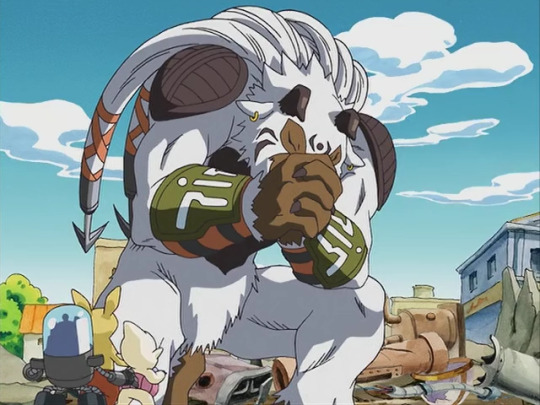
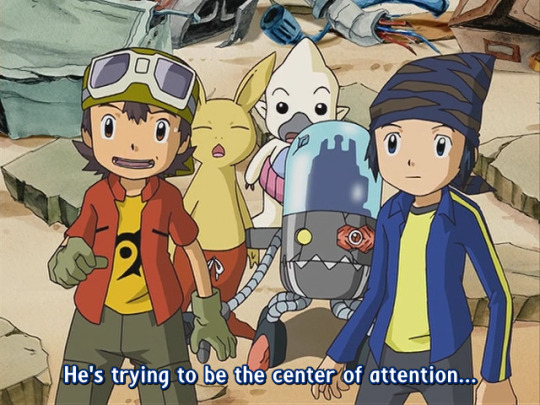
When we get to the next episode (17), you’ll also notice that one of the first things Blizzarmon (Tomoki) does is actively attempt to restrain himself. If you look back at what Tomoki’s character arc is about, he’d spent the better part of his past being bullied by others and tossed around, so “overpowering the weak” is the last thing Tomoki ever wants to do (especially given the events of this episode, as well). So, having witnessed the potential consequences of the Beast Spirit with the other boys, it stands to reason that Tomoki would want to avoid “hurting others” so much that restraining this would be a strong priority for him. While it’s commented that it does take his personality out of control a bit, the worst it ever gets is that he seems to be overly elated and cheerful about his defeats, but that’s also in line with Tomoki constantly having been pushed down so much during his life that you can imagine he’s enjoying the opportunity to finally be strong and have the spotlight.
But because he hates the concept of bullying and pushing others down so much, it stands to reason that he wouldn’t really have as much of a problem with that.
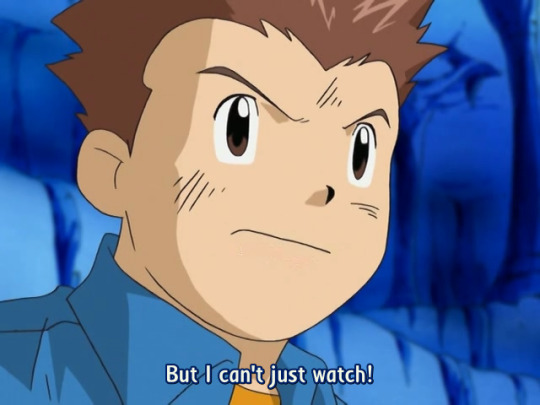
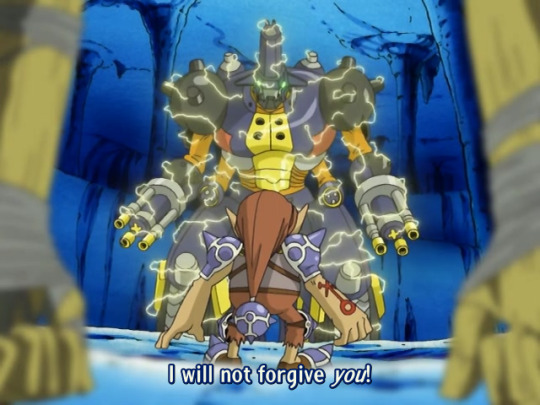
So when you look back at the prior episodes with the Beast Spirits with this context, you can see it applying there as well. In episode 14, Junpei was spending the better part of the first half of the episode livid at what was happening to his friends -- absolutely pissed at Grottomon for taking Izumi's spirit (and, despite Izumi's doubts, it's pretty apparent he actually does care about it beyond just having a crush on her), and then upset at the idea of being a sitting duck while Agnimon and Wolfmon are getting tossed around. While Junpei initially has trouble keeping the Spirit under control, the exact moment he gets a grip on himself is the moment he reaffirms his determination to fight for the sake of his friends.
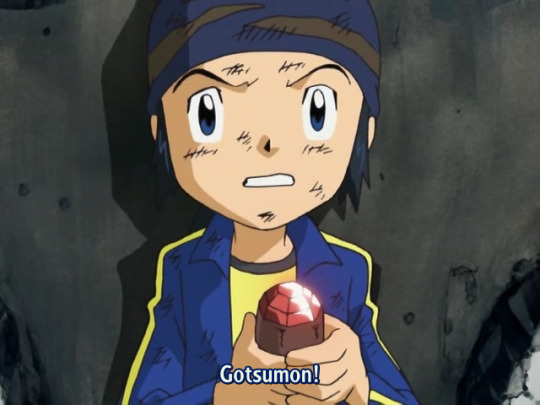
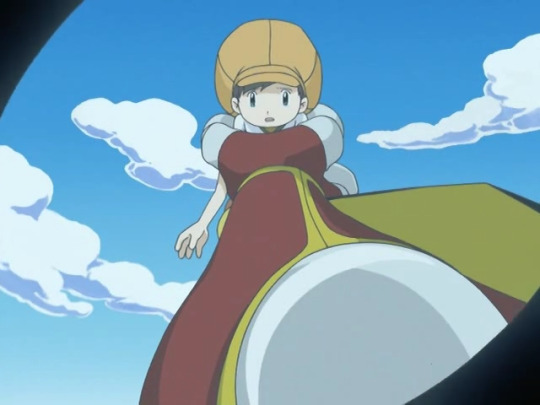
Looking back at the other two episodes about rampaging Beast Spirits in episodes 10 and 12, you can also see why the concept applies there as well. It’s interesting how the “worst” rampage shown among the main protagonist Beast Spirits was not the first one obtained (Garmmon) but the second one (Vritramon), and if you look at the circumstances surrounding them, it doesn’t seem to mean as much about Takuya having any particular stronger tendency towards condescending violence as much as the sheer circumstances that went on behind them:
Kouji obtained his Beast Spirit under the circumstances of already knowing that he needed to protect Gotsumon with that power (and, moreover, having spent the end of the prior episode and the duration of the beginning of this one mulling on Ophanimon’s warning that he’d need to “grow” before he could obtain it). Therefore, “using this power for the desire to protect others” was a huge thought in his head from the very beginning, even though -- presumably partially because this was a first time for everyone -- it threw him off just enough for him to end up exhausting himself.
Takuya obtained his without warning and without proper understanding of what he was dealing with, having had it practically forced on him after Shamamon-as-Vritramon’s defeat, and so, with no context of purpose and no real depth of what he was about to get into, he ended up on a complete destructive rampage. He was snapped out successfully by the need to not hurt someone (Tomoki), and spent the rest of the episode agonizing and mulling over the risks and meaning of having such power before he eventually evolved into Vritramon without too much issue the second time.
So the point is made clear: the “destructive” and “uncontrollable” impulses associated with the Beast Spirits will be sent out of control if the user doesn’t have a strong desire to use it with proper purpose. For Ranamon/Calmaramon, she had the worst time with it because she was the single most obsessed out of the Legendary Warriors to use it to stroke her own ego and vanity, whereas at least the other three Cherubimon-allied ones (besides Duskmon -- see below) were at least capable of using it towards a greater goal, and the remaining five went through the proper outlets of thinking about how this power should be used and how it shouldn’t be used lightly.
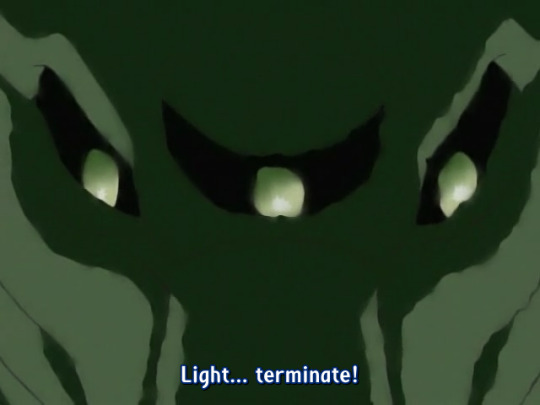
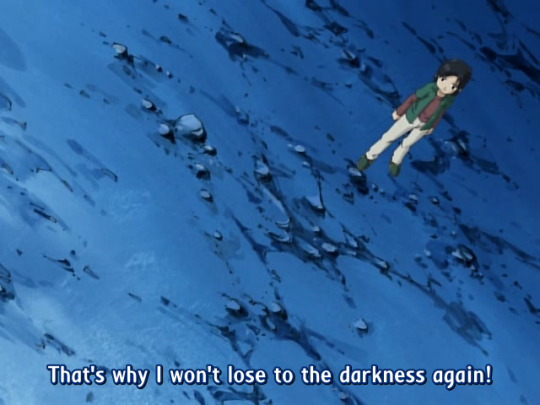
While the issue of the Beast Spirits being inherently difficult to control isn’t as prominent as we go later into the series, we do actually see shades of it when we get to the tale of Kouichi/Duskmon/Velgrmon, because while part of it can be chalked up to the power of darkness being consuming, Kouichi, during his first transformation to Velgrmon in episode 30, is only able to talk barely coherently and is really just venting his rage and anger out, presumably because his entire state of mind is locked into all of that, making the rampage even worse. (Also keeping in mind the theme of embracing the idea of changing yourself, you can also think of this in terms of how Kouichi is getting so consumed by his own emotions of anger that he’s become almost completely unrecognizable from his original self.)
Once we get his first “proper” evolution in episode 33, however, Kouichi is abundantly aware of what he’s done and has all of the proper determination to never let such a thing happen again -- so it’s not surprising that his evolution to KaiserLeomon happens with relatively little incident.
189 notes
·
View notes
Text
As a muslim Iraqi American with a significant tumblr following, I feel as though I should let it be known exactly where I stand when it comes to Riordan’s statement about Samirah. I have copied and pasted it down below and my reaction to it will be written down below. This will be the first time I have read it. If you want to engage with me or tell me that I’m wrong, I expect you to be a muslim, hijabi, Iraqi American, and from Baghdad. If you are not, I suggest you sit down and keep quiet because you are not the authority on the way I should be represented.
Like many of my characters, Samirah was inspired by former students of mine. Over the course of my middle school teaching career, I worked with dozens of Muslim students and their families, representing the expanse of the Muslim world and both Shia and Sunni traditions. One of my most poignant memories about the September 11, 2001, attack of the World Trade Center was when a Muslima student burst into tears when she heard the news – not just because it was horrific, but also because she knew what it meant for her, her family, her faith. She had unwillingly become an ambassador to everyone she knew who, would have questions about how this attack happened and why the perpetrators called themselves “Muslim.” Her life had just become exponentially more difficult because of factors completely beyond her control. It was not right. It was not fair. And I wasn’t sure how to comfort or support her.
Starting off your statement with one of the most traumatic events in history for muslim Americans is already one of the most predictably bad moves he could pull. By starting off this way, you are acknowledging the fact that a) this t*rrorist attack is still the first thing you think of when you think of muslims and b) that those muslim students who you had prior to 9/11 occupied so little space in your mind that it took a national disaster for you to start to even try to empathize with them.
During the following years, I tried to be especially attuned to the needs of my Muslim students. I dealt with 9/11 the same way I deal with most things: by reading and learning more. When I taught world religions in social studies, I would talk to my Muslim students about Islam to make sure I was representing their experience correctly. They taught me quite a bit, which eventually contributed to my depiction of Samirah al-Abbas. As always, though, where I have made mistakes in my understanding, those mistakes are wholly on me.
As always, you have chosen to use “I based this character off my students” in order to justify the way they are written. News flash: you taught middle school children. Children who are already scrutinized and alienated and desperate to fit in. Of course their words shouldn’t be enough for you to decide you are representing them correctly, because they are still coming to terms with their identities and they are doing this in an environment where they are desperate to find the approval of white Americans. I know that as a child I would often tweak the way I explained my culture and religion to my teachers in order to gain their approval and avoid ruffling any feathers. They told you what they thought you’d want to hear because you are their teacher and hold a position of power over them and they both want your approval and want to avoid saying the wrong thing and having that hang over their heads every time they enter your classroom.
What did I read for research? I have read five different English interpretations of the Qur’an. (I understand the message is inseparable from the original Arabic, so it cannot be considered ‘translated’). I have read the entirety of the Sahih Bukhari and Sahih Muslim hadith collections. I’ve read three biographies of Prophet Muhammed (peace be upon him) and well over a dozen books about the history of Islam and modern Islam. I took a six-week course in Arabic. (I was not very good at it, but I found it fascinating). I fasted the month of Ramadan in solidarity with my students. I even memorized some of the surahs in Arabic because I found the poetry beautiful. (They’re a little rusty now, I’ll admit, but I can still recite al-Fātihah from memory.) I also read some anti-Islamic screeds written in the aftermath of 9/11 so I would understand what those commenters were saying about the religion, and indirectly, about my students. I get mad when people attack my students.
And yet here you are actively avoiding the criticism from those of us who could very well have been the children sitting in your classroom.
The Quran is so deep and complex that its meanings are still being discovered to this day. Yes, reading these old scripts is a must for writing muslim characters, but you cannot claim to understand them without also holding active discussions with current scholars on how the Quran’s teachings apply today.
When preparing to write Samirah’s background, I drew on all of this, but also read many stories on Iraqi traditions and customs in particular and the experiences of immigrant families who came to the U.S. I figured out how Samirah’s history would intertwine with the Norse world through the medieval writer Ahmad ibn Fadhlan, her distant ancestor and one of the first outsiders to describe the Vikings in writing. I knew Samirah would be a ferocious brave fighter who always stood for what was right. She would be an excellent student who had dreams of being an aviator. She would have a complicated personal situation to wrestle with, in that she’s a practicing Muslim who finds out Valhalla is a real place. Odin and Thor and Loki are still around. How do you reconcile that with your faith? Not only that, but her mom had a romance with Loki, who is her dad. Yikes.
First of all, writing this paragraph in the same tone you use to emulate a 12 year old is already disrespectful. “Yikes” is correct. You have committed serious transgressions and can’t even commit to acting serious and writing like the almost 60 year old man that you are. Tone tells the reader a lot, and your tone is telling me that you are explaining your mistakes the same way you tell your little stories: childishly and jokingly.
Stories are not enough. They are not and never will be. Stories cannot even begin to pierce the rich culture and history and customs of Iraq. Iraq itself is not even homogenous enough for you to rely on these “Iraqi” stories. Someone’s story from Najaf is completely unique from someone from Baghdad or Nasriyyah or Basrah or Mosul. Add that to the fact that these stories are written with a certain audience in mind and you realize that there’s no way they can tell the whole story because at their core they are catering to a specific audience.
Yes, those are good, but they are meaningless without you consulting an actual Baghdadi and asking specific questions. You made conclusions and assumptions based on these stories when the obvious way to go was to consult someone from Baghdad every step of the writing process. Instead, you chose to trust the conclusions that you (a white man) drew from a handful of stories. Who are you to convey a muslim’s internal struggle when you did not even do the bare minimum and have an actual muslim read over your words?
Thankfully, the feedback from Muslim readers over the years to Samirah al-Abbas has been overwhelmingly positive. I have gotten so many letters and messages online from young fans, talking about how much it meant to them to see a hijabi character portrayed in a positive light in a ‘mainstream’ novel.
Yeah. Because we’re desperate, and half of them are children still developing their sense of self and critical reading skills. A starving man will thank you for moldy bread but that does not negate the mold.
Some readers had questions, sure! The big mistake I will totally own, and which I have apologized for many times, was my statement that during the fasting hours of Ramadan, bathing (i.e. total immersion in water) was to be avoided. This was advice I had read on a Shia website when I myself was preparing to fast Ramadan. It is advice I followed for the entire month. Whoops! The intent behind that advice, as I understood it, was that if you totally immersed yourself during daylight hours, you might inadvertently get some water between your lips and invalidate your fast. But, as I have since learned, that was simply one teacher’s personal opinion, not a widespread practice. We have corrected this detail (which involved the deletion of one line) in future editions, but as I mentioned in my last post, you will still find it in copies since the vast majority of books are from the first printing.
This is actually really embarrassing for you and speaks to your lack of research and reading comprehension. It is true that for shia, immersion breaks one’s fast. If you had bothered to actually ask questions and use common sense, you would realize that this is referring to actions like swimming, where one’s whole body is underwater, rather than bathing. Did you not question the fact that the same religion that encourages the cleansing of oneself five times a day banned bathing during the holiest month? Yes, it was one teacher’s opinion, but you literally did not even take the time to fully understand that opinion before chucking it into your book.
Another question was about Samirah’s wearing of the hijab. To some readers, she seemed cavalier about when she would take it off and how she would wear it. It’s not my place to be prescriptive about proper hijab-wearing. As any Muslim knows, the custom and practice varies greatly from one country to another, and from one individual to another. I can, however, describe what I have seen in the U.S., and Samirah’s wearing of the hijab reflects the practice of some of my own students, so it seemed to be within the realm of reason for a third-generation Iraqi-American Muslima. Samirah would wear hijab most of the time — in public, at school, at mosque. She would probably but not always wear it in Valhalla, as she views this as her home, and the fallen warriors as her own kin. This is described in the Magnus Chase books. I also admit I just loved the idea of a Muslima whose hijab is a magic item that can camouflage her in times of need.
Before I get into this paragraph, Samirah is second generation. Her grandparents immigrated from Iraq. Her mother was first gen.
Once again, you turn to what you have seen from your students, who are literal children. They are in middle school while Samirah is in high school, so they are very obviously at different stages of development, both emotional and religious. If you had bothered to talk to adults who had gone through these stages, you would understand that often times young girls have stages where they “practice” hijab or wear it “part time”, very often in middle school. However, both her age and the way in which you described Samirah lead the reader to believe that she is a “full timer,” so you playing willy nilly with her scarf as a white man is gross.
For someone who claims to have read all of these religious texts, it’s funny that you choose to overlook the fact that “kin” is very specifically described. Muslims do not go around deciding who they consider “kin” or “family” to take off their hijab in front of. There is no excuse for including this in her character, especially since you claim to have carefully read the Quran and ahadith.
You have no place to “just love” any magical extension of the hijab until you approach it with respect. Point blank period. Especially when you have ascribed it a magical property that justifies her taking it on and off like it’s no big deal, especially when current media portrayals of hijab almost always revolve around it being removed. You are adding to the harmful portrayal and using your “fun little magic camoflauge” to excuse it.
As for her betrothal to Amir Fadhlan, only recently have I gotten any questions about this. My understanding from my readings, and from what I have been told by Muslims I know, is that arranged marriages are still quite common in many Muslim countries (not just Muslim countries, of course) and that these matches are sometimes negotiated by the families when the bride-to-be and groom-to-be are quite young. Prior to writing Magnus Chase, one of the complaints I often heard or read from Muslims is how Westerners tend to judge this custom and look down on it because it does not accord with Western ideas. Of course, arranged marriages carry the potential for abuse, especially if there is an age differential or the woman is not consulted. Child marriages are a huge problem. The arrangement of betrothals years in advance of the marriage, however, is an ancient custom in many cultures, and those people I know who were married in this way have shared with me how glad they were to have done it and how they believe the practice is unfairly villainized. My idea with Samirah was to flip the stereotype of the terrible abusive arranged match on its head, and show how it was possible that two people who actually love each other dearly might find happiness through this traditional custom when they have families that listen to their concerns and honor their wishes, and want them to be happy. Amir and Samirah are very distant cousins, yes. This, too, is hardly unusual in many cultures. They will not actually marry until they are both adults. But they have been betrothed since childhood, and respect and love each other. If that were not the case, my sense is that Samirah would only have to say something to her grandparents, and the match would be cancelled. Again, most of the comments I have received from Muslim readers have been to thank me for presenting traditional customs in a positive rather than a negative light, not judging them by Western standards. In no way do I condone child marriage, and that (to my mind) is not anywhere implied in the Magnus Chase books.
I simply can’t even begin to explain everything that is wrong with this paragraph. Here is a good post about how her getting engaged at 12 is absolutely wrong religiously and would not happen. Add that on to the fact that Samirah herself is second-generation (although Riordan calls her third generation in this post) and this practice isn’t super common even in first generation people (and for those that it DOES apply to, it is when they are old enough to be married and not literal children).
As a white man you can’t flip the stereotype. You can’t. Even with tons of research you cannot assume the authority to “flip” a stereotype that does not affect you because you will never come close to truly understanding it inside and out. Instead of flipping a stereotype, Rick fed into it and provided more fodder to the flames and added on to it to make it even worse.
I would be uncomfortable with a white author writing about arranged marriages in brown tradition no matter the context, but for him to offhandedly include it in a children’s book where it is badly explained and barely touched on is inexcusable. Your target audience is children who will no doubt overlook your clumsy attempt at flipping stereotypes.
It does not matter what your mind thinks you are implying. Rick Riordan is not your target audience, children are. So you cannot brush this away by stating that you did not see the harm done by your writing. You are almost 60 years old. Maybe you can read in between your lines, but I guarantee your target audience largely cannot.
Finally, recently someone on Twitter decided to screenshot a passage out-of-context from Ship of the Deadwhere Magnus hears Samirah use the phrase “Allahu Akbar,” and the only context he has ever heard it in before was in news reports when some Western reporter would be talking about a terrorist attack. Here is the passage in full:
Samirah: “My dad may have power over me because he’s my dad. But he’s not the biggest power. Allahu akbar.”
I knew that term, but I’d never heard Sam use it before. I’ll admit it gave me an instinctive jolt in the gut. The news media loved to talk about how terrorists would say that right before they did something horrible and blew people up. I wasn’t going to mention that to Sam. I imagined she was painfully aware.
She couldn’t walk the streets of Boston in her hijab most days without somebody screaming at her to go home, and (if she was in a bad mood) she’d scream back, “I’m from Dorchester!”
“Yeah,” I said. “That means God is great, right?”
Sam shook her head. “That’s a slightly inaccurate translation. It means God is greater.”
“Than what?”
“Everything. The whole point of saying it is to remind yourself that God is greater than whatever you are facing—your fears, your problems, your thirst, your hunger, your anger.
337-338
To me, this is Samirah educating Magnus, and through him the readers, about what this phrase actually means and the religious significance it carries. I think the expression is beautiful and profound. However, like a lot of Americans, Magnus has grown up only hearing about it in a negative context from the news. For him to think: “I had never heard that phrase, and it carried absolutely no negative connotations!” would be silly and unrealistic. This is a teachable moment between two characters, two friends who respect each other despite how different they are. Magnus learns something beautiful and true about Samirah’s religion, and hopefully so do the readers. If that strikes you as Islamophobic in its full context, or if Samirah seems like a hurtful stereotype . . . all I can say is I strongly disagree.
I will give you some credit here in that I mostly agree with this scene. The phrase does carry negative connotations with many white people and I do not fault you for explaining it the way you did. However, don’t try to sneak in that last sentence like we won’t notice. You have no place to decide whether or not Samirah’s character as a whole is harmful and stereotypical.
It is 2 am and that is all I have the willpower to address. This is messy and this is long and this is not well worded, but this had to be addressed. I do not speak for every muslim, both world wide and within this online community, but these were my raw reactions to his statement. I have been working on and will continue to work on a masterpost of Samirah Al-Abbas as I work through the books, but for now, let it be known that Riordan has bastardized my identity and continues to excuse himself and profit off of enforcing harmful stereotypes. Good night.
3K notes
·
View notes
Text
Why Spones is a top-tier ship
AKA “the inherent homoeroticism of annoying the shit out of your co-worker.”
Spock and McCoy have a complicated relationship. A lot of their bickering and ideological differences lead fans to believe that they hate each other, but that’s an over-simplification of the truth. The reality is that Spock and McCoy are extremely close friends who care about each other deeply. Though sometimes their bickering turns serious during stressful situations, for the most time they seem to enjoy the banter. A common mischaracterization of their relationship seems to put McCoy as the bully and Spock as the victim. In truth, there are many times where Spock will say something specifically to get a rise out of McCoy. They fight. That’s how they show affection, not disdain. In fact, one could argue that some of their bantering have a flirtatious tone to it.
Kirk: Mister Spock, regaining eyesight would be an emotional experience for most. You, I assume, felt nothing.
Spock: On the contrary Captain. I had a very strong reaction. My first sight was the face of Doctor McCoy bending over me.
McCoy: ‘Tis a pity brief blindness didn’t increase your appreciation for beauty, Spock. (Operation -- Annihilate!)
Spock is a half-Vulcan, half-Human who has mostly chosen to follow his Vulcan heritage. As such, he is a being of almost pure logic. The truth about Vulcans are that they are secretly beings who feel things very deeply and intensely, and they feel the need to keep a tight lid on their emotions as to not succumb to them. McCoy, on the other hand, is a regular human. He’s a deeply emotional man who cares about others. One could argue that McCoy is almost too empathetic, as he lets his emotions rule him. Spock and McCoy are polar opposites; the brain and the heart, the logic and the emotion, the super-ego and the id.
Despite these differences, the two men are similar in a lot of ways. They’re both men of science, men of peace, and they both care very deeply for their Captain. They’re both self-sacrificing morons, to the chagrin of the other. Spock will prioritize McCoy’s life even when both of them know it’s not the logical choice to do so. Likewise, McCoy will take a hit for Spock even when they both know the Vulcan is stronger and better equipped to deal with pain than the doctor.
Spock: (In the middle of a blizzard) In this severe cold, we cannot survive much longer.
McCoy: Leave me here, Spock.
Spock: We go together or not at all.
McCoy: Don’t be a fool. My hands and face are frostbitten. I can’t feel my feet. Alone, you have a chance. Now do what I say. Go try to find Jim.
Spock: We go together! (All of Yesterdays)
In the episode, “The Empath,” Kirk, Spock and McCoy have to choose someone to be offered as sacrifice to be tortured by a group of aliens. Kirk obviously volunteers, but gets put to sleep by McCoy with a tranquilizer. Spock then states that he’ll offer himself up, as he has the higher chance of surviving the torture. McCoy then proceeds to sedate Spock as well, and sacrifices himself to be tortured by the aliens.
Spock: While the captain is asleep, I am in command. When the Vians return, I shall go with them.
McCoy: You mean, if I hadn't given him that shot
Spock: Precisely. The choice would have been the captain's. Now it is mine.
(McCoy turns away. Spock sits to carry on working. Gem puts her hand on Spock's shoulder, and smiles. McCoy comes up behind him and gives him an injection.)
Spock: Your action is highly unethical. My decision stands. (Spock falls asleep next to Kirk.)
McCoy: Not this time, Spock.
Underneath all the fighting and disagreements, there is a deep caring between Spock and McCoy that manifests itself into protectiveness towards each other. In “All of Yesterdays,” Spock is constantly showing concern for McCoy after he almost died of hypothermia. In aftermath of McCoy’s torture in “The Empath,” Spock is seen hovering over his body and caressing his face, worry written into his features. On the other hand, while McCoy constantly makes fun of Spock for his lack of emotions, he’s also highly aware of the Vulcan’s mental state and protective of it when others threaten to shatter his resilience.
McCoy: He's a Vulcan. You can't force emotion out of him.
Philana: You must be joking, Doctor.
McCoy: You'll destroy him.
Parmen: We can't let him die laughing, can we?
McCoy: (Watching as Spock starts to cry) I beg you! (Plato’s Stepchildren)
The episode “Amok Time” also demonstrates McCoy’s perceptiveness of Spock and Spock’s true feelings of friendship towards McCoy. McCoy is in fact the first person to notice that something is wrong with Spock:
McCoy: Oh, captain. Got a minute? It's Spock. Have you noticed anything strange about him?
Kirk: No, nothing in particular. Why ?
McCoy: Well, it's nothing I can pinpoint without an examination, but he's become increasingly restive. If he were not a Vulcan, I'd almost say nervous. And for another thing, he's avoiding food. I checked and he hasn't eaten at all in three days.
Kirk: That just sounds like Mister Spock in one of his contemplative phases.
Kirk doesn’t notice anything wrong with Spock, and initially dismisses McCoy’s concern, but McCoy immediately picked up on Spock’s mental turmoil. Despite his cantankerousness, McCoy not only cares about Spock but goes out of his way to look out for his mental state. Part of it might be because he’s his doctor, but how many doctors go so far as to monitor someone’s eating habits because they notice that person’s suddenly being fidgety? On Spock’s end, when it comes time for him to beam down to Vulcan to complete his marriage ceremony, he specifically asks for McCoy to be there:
Spock: By tradition, the male is accompanied by his closest friends.
Kirk: Thank you, Mister Spock.
Spock: I also request McCoy accompany me.
McCoy: I shall be honoured, sir.
One episode I find extremely fascinating in terms of McCoy/Spock moments is “Mirror, Mirror.” In this famous episode, half of the Enterprise crew get transported into an alternate universe dubbed The Mirror Verse, in which evil versions of the characters exist and terrorize space as a fearsome military force. McCoy is part of the team that gets transported in the Mirror Verse, while Spock stays in their regular universe. Mirror Spock immediately realizes that half of the crew, including Kirk and McCoy, are acting strangely. When he corners Kirk to question him, he does so by threatening McCoy: “I shall not waste time with you. You’re too inflexible, too disciplined, once you’ve made up your mind. But Doctor McCoy has a plenitude of human weaknesses, sentimental, soft. You may not tell me what I want to know, but he will.” This Spock seems to have a intimate knowledge of McCoy’s mind. When the party decides to attack Mirror Spock, he fights all of them except for Uhura and McCoy, who he simply pushes out of harm’s way.
When Mirror Spock gets hurt as the crew is trying to escape back to their own universe, McCoy is suddenly unable to leave his side. Kirk allows him to stay to nurse Spock back to health, and McCoy risks almost staying in the Mirror Verse forever for him. When Mirror Spock awakes, he backs McCoy into a wall and initiates a forced mind meld onto the doctor. The next scene has Mirror Spock holding a disoriented McCoy up and bringing him back to his crew; he now understands what is happening and he wants his regular crew back, and thus he allows Kirk and company to make the switch back to their own universe.
Other Star Trek properties have gone more in depth on how a forced mind meld can be extremely traumatizing on the person receiving it. Star Trek: Enterprise has an entire story arc dedicated to the Vulcan T’Pol trying to heal from a forced mind meld. Unfortunately, because the nature of TOS episodes were episodic, we never got the chance to explore the emotional fallout of McCoy’s forced mind meld and how that might have affected his relationship with Spock. The franchise also never went in depth on Mirror McCoy outside of what Mirror Spock speaks of him, since Mirror McCoy died of xenopolycythemia in 2269.
Closing the list of evidence of Spock and McCoy’s affections towards each other are the Star Trek movies “The Wrath of Khan” and “The Search for Spock.” Towards the end of Wrath of Khan, Spock sacrifices himself to save The Enterprise in one of the franchises most heart-wrenching scenes. Moments before his sacrifice, he knocks McCoy unconscious, touches his face and whispers “remember.” What happened in this scene was that Spock, knowing he was about to die, transferred his Katra to McCoy. The katra being the Vulcan equivalent of a soul. This speaks to the amount of trust that Spock has in McCoy. For someone who keeps most of his emotions under a tight lid, it’s a huge gesture to entrust another with the essence of their entire being. The next movie, The Search for Spock, is a journey as the Enterprise crew fight to return to Vulcan so they can reunite Spock with his body. When they finally arrive, the Vulcans warn McCoy that the process is extremely dangerous and could even result in his death. McCoy calmly replies that he “chooses the danger.” He cannot fathom living his life without Spock.
McCoy: (Speaking to Spock) I'm going to tell you something that I... I never thought I'd hear myself say...But it seems I've missed you. I don't know if I could stand to lose you again.
So in conclusion, Spock and McCoy have a rich and complex relationship that is much more than simply just “they dislike each other because they bicker a lot.” Their bickering is more akin to that of an old married couple. There are plenty of examples not even included in this post of how deeply they care for each other. Despite their ideological differences, they balance each other out quite nicely. McCoy is finely attuned to Spock’s emotions, arguably better than anyone else on the ship. Spock in turn is protective and gentle with McCoy. Once you stop looking at their interactions solely on the surface level, you’ll be able to see the tenderness and years of love and friendship between them. This is why I think Spock/McCoy is one of the most underrated and misunderstood relationships of TOS. Don’t let the constant arguing fool you into believing these two dummies don’t adore each other.
Shout-out to Tempest for their extremely lengthy ship manifesto on Spones called “Spiced Peaches,” which goes even more in depth on why Spones is a great couple. Using their manifesto as a reference was key to remembering Spock/McCoy moments. Also shout-out to the site chakoteya for having full transcripts of TOS episodes, so I could easily find quotes for this. If you’ve come this far, thanks for reading!

281 notes
·
View notes